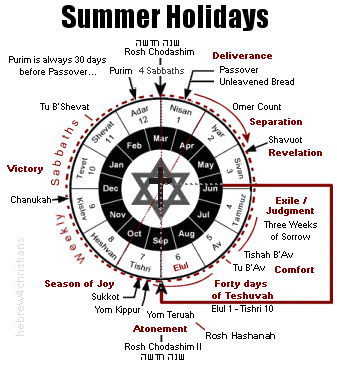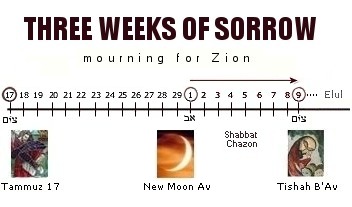|
Jewish Holiday Calendar
Note: For June 2016 site updates, please scroll past this entry....
In the summer there occurs a three week period of mourning that begins with the Fast of Tammuz and ends with Tishah B'Av. The last nine days of this three week period (i.e., from Av 1 until Av 9th) are days of increased mourning. However, after this somber time, the romantic holiday of Tu B'Av, the 15th of Av occurs. Summer ends with the 30 days of the month of Elul, a yearly season of teshuvah (repentance) that anticipates Rosh Hashanah and the fall holidays. The 30 days of Elul are combined with the first 10 days of the month of Tishri to create the "Forty Days of Teshuvah" that culminate with Yom Kippur.
Because they occur between the spring and fall holidays, the summer holidays help us prepare for the second coming of the Messiah:
The Summer Holidays:

Note that in accordance with tradition, holiday dates begin at sundown. Moreover, some holidays may be postponed one day if they happen to fall on the weekly Sabbath:
- Month of Tammuz (begins Tuesday, July 5th, 2016)
- Month of Av (begins Thursday, Aug. 4th, 2016)
- Month of Elul (begins Friday Sept. 2nd, 2016)
- Month of Tishri (begins Sunday, Oct. 2nd, 2016)
Note: Some calendars will list the first day of a holiday without indicating that the holiday actually begins sundown the night before... So, for example, while Tishah B'Av begins Saturday, August 13th at sundown, many calendars will indicate it occurs on Monday, August 14th...
June 2016 Updates
Note: If any page content appears to be missing, please refresh the page...
Finding Perfect Peace...
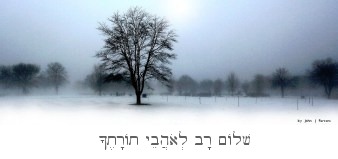
06.30.16 (Sivan 24, 5776) Fear (and it's offspring, anger) create a sense of exile within the heart. This was true of the spies who refused to trust in God's promises but instead relied on human reason to consider the world. As we focus on the LORD and spiritual reality, however, we are delivered from fear, since God's light and love overcome all our darkness (John 1:5; 1 John 4:18; 5:3). The Spirit of God calls out: "Fear not, for I have redeemed you; I have called you by name, you are mine" (Isa. 43:1). God has personally redeemed you, friend; He calls you by name, and you belong to Him. The Lord loves you with an "everlasting love" and draws you close (Jer. 31:3). He will never forsake you, even if you might face waters that seem to overwhelm or fires that seem to devour (Isa. 43:2). The LORD will keep you in "perfect peace" - the "peace of peace" (שָׁלוֹם שָׁלוֹם), when you set your mind on Him.
יֵצֶר סָמוּךְ תִּצּר שָׁלוֹם שָׁלוֹם כִּי בְךָ בָּטוּחַ
בִּטְחוּ בַיהוָה עֲדֵי־עַד כִּי בְּיָהּ יְהוָה צוּר עוֹלָמִים
ye·tzer · sa·mukh · titz·tzor · sha·lom · sha·lom · ki · ve·kha · ba·tu·ach
bit·chu · vadonai · a·di-ad · ki · be·Yah · Adonai · tzur · o·la·mim

You will keep him in perfect peace whose mind is stayed on you, for he trusts in you.
Trust in the LORD forever, for Yah the LORD is an everlasting rock.
(Isa. 26:3-4)
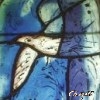
Hebrew Study Card
When we forget that God is in complete control of all things, we tend to grow anxious... Feeling worried comes from focusing on ourselves, a perspective that can make us feel alone, forgotten, and even victimized in this world. Worry moves us to defend ourselves, to seek refuge in our own devices, and to forfeit the will of God according to the dictates of lesser fears... The sages say it is not permitted to worry: "To worry is a sin; only one sort of worry is permissible; to worry because one worries." We should worry that we worry because this indicates our hardness of heart and our unbelief! God's name YHVH (יהוה) means "Presence," "Breath," "Life," and "Love." So why be anxious for "tomorrow"? We really only have this moment, but this moment is entirely sufficient when we walk in the light of God and seek to know him in all our ways. "Let the peace of God rule in you" (Col. 3:15).
The Father of Lights...
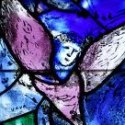
06.30.16 (Sivan 24, 5776) It is written in our Scriptures: "God is light and in him is no darkness at all" (1 John 1:5). Our Savior is "the Light of the world," the overarching Reality that gives light to every soul who is born (John 1:9). As the Source of all light, his power is irrepressible, invincible, and overcomes every shade of darkness. Yeshua is the Logos (Λόγος), the underlying "logic" of all of creation. Unlike the transient radiance of the heavenly bodies, the Divine Light remains constant and supreme over all of creation, without any diminution or variation: God is the "Father of Lights" (James 1:17). And just as we know that the sun still shines even on the most overcast of days, so we understand that the Divine Presence is always there -- always giving, always shining, always loving us... We can trust in the power of our God to help us, since His radiance and truth pervade the darkness to enlighten our way (Psalm 112:4). As Yeshua said of his mission, "I have come into the world as light, so that whoever believes in me may not remain in darkness" (John 12:46). O precious LORD our God, let your light shine upon us...
אֱלהִים יְחָנֵּנוּ וִיבָרְכֵנוּ
יָאֵר פָּנָיו אִתָּנוּ סֶלָה
E·lo·him · ye·chon·nei·nu · vi·var·khei·nu
ya·er · pa·nav · it·ta·nu · se·lah

"May God be gracious to us and bless us
and make his face to shine upon us, selah."
(Psalm 67:1)

Allow the light of God's love to shine in you brightly. As Yeshua our Savior said, "Whoever has my commandments and keeps them, such is the one who loves me. And the one who loves me will be loved by my Father, and I will love him and will manifest myself to him" (John 14:21). Note that the Greek word for "manifest" means to "shine inside" (i.e., ἐμφανίζω, from ἐν, "in" and φαίνω, "shine"), indicating that the revelation would be inward light of the Divine Presence. Indeed, the Hebrew word for "praise" (i.e., tehillah: תְּהִלָּה) comes from a verb that means "to shine" (i.e., halal: הָלַל), from which we derive the word "halo." Similarly, the word "aura" comes from the Hebrew word "ohr" (אוֹר), meaning "light." Let your inner light shine before others so that they may see your good works and give honor to your Father who is in heaven" (Matt. 5:16).
Beholding Promised Good...

06.29.16 (Sivan 23, 5776) How we see is a spiritual decision... From our Torah portion this week (i.e., Shelach Lekha) we read: "See the land, what it is ... whether it be good or bad ... and strengthen yourselves" (Num. 13:18-20). Here note that right seeing – even the negative aspects of the land such as the presence of "giants" – can only be achieved by the courage derived from faith. When you see things that appear bad, you are to "strengthen yourselves," a Hebrew verb (i.e., וְהִתְחַזַּקְתֶּם) that means to intently decide to see the good despite the present veil of appearances. When we encounter things that are bad, we must refuse to be overwhelmed by carnal reasoning and fear by looking beyond the moment to behold a promised good (2 Cor. 4:18).
Finding Real Treasure...

06.29.16 (Sivan 23, 5776) For what do you hope? What are your dreams? Your deepest desires? Where is your treasure? Yeshua cautioned those who sought their happiness in this world: "Do not store up for yourselves treasures upon earth... be rich toward God" (Matt. 6:19-20; Luke 12:21). When we treasure God, our focus is directed toward the eternal reality, and our interest in this world is minimal. We trust God to meet our daily needs and surrender our future to His care. The only worry we face concerns our own deficiencies in our obligations to the Savior. Our duty is to love God in the truth - bekhol levavkha - with all our heart, having no thought of ourselves. Indeed, self-denial means to quit thinking about yourself (from α-, "not," + ῥέω, "to speak") by accepting what God has done for you. "It is not my business to think about myself. My business is to think about God. It is for God to think about me" (Simone Weil).
מִי־לִי בַשָּׁמָיִם
וְעִמְּךָ לא־חָפַצְתִּי בָאָרֶץ
mi · li · va·sha·ma·yim
ve·im·me·kha · lo · cha·fatz·ti · va·a·retz

"Whom have I in heaven but you?
And there is nothing on earth that I desire besides you."
(Psalm 73:25)

Download Study Card
Spying with little eye...

06.28.16 (Sivan 22, 5776) Which will you choose to believe - the "spying eyes" of the flesh, or the Word and promise of the LORD God Almighty? The "eyes of the flesh" focus on this world and its possibilities (חַיֵּי שָׁעָה) and are therefore unable to discern beyond mere surface appearances. They are easily seduced by superficialities and glitter of this world and its vanities (עוֹלָם הַשֶּׁקֶר). The eyes of faith, on the other hand, "look not to the things that are seen but to the things that are unseen. For the things that are seen are transient, but the things that are unseen are eternal" (2 Cor. 4:18). Faith sees the realm of the invisible (חַיֵּי עוֹלָם): For we "walk by faith, not by sight." We are "saved by hope," but hope that is seen is not hope (Rom. 8:24-25). Faith is the foundation (ὑπόστασις) of things hoped for, the conviction (ἔλεγχος) of things (πρᾶγμα) not seen" (Heb. 11:1).
In our Torah portion this week, the people had trekked across the desert of Paran for several days, with their camps ordered in military precision. The Ark of the Covenant was in their midst and the Shekhinah Glory filled the desert skies. Now the people were at Kadesh Barnea (קָדֵשׁ בַּרְנֵעַ), about 11 days out from Sinai and about three days to the border of the promised land... The great promise of Zion was finally within reach! But then a dark misgiving arose within the heart of the people... fear ... the old whisper of the enemy was heard in the desert wind: "has God really said...?" (Gen. 3:1). In light of the events of the great Exodus, the mistrust of the people demonstrates that miracles are insufficient to sustain our faith. "An evil and adulterous generation seeks for a sign." Seeing isn't believing, but rather the other way around. Yeshua made this point in His parable of the rich man and Lazarus (Luke 16:19-31). Even if a person should encounter someone literally risen from the dead it wouldn't suffice to impart true faith (Luke 16:31). The great sin that so angered God to declare: "I swore in My wrath, they shall not enter into My rest..." was not that of the Golden Calf, as dreadful as that was, but rather the sin of unbelief.... "So we see that they could not enter in because of unbelief. Let us, therefore, fear lest, a promise being left us of entering into His rest, any of you should seem to come short of it" (Heb. 3:7-4:2).
 |
Faith and Persecution...

06.28.16 (Sivan 22, 5776) Did you know that Christianity is by far the most persecuted religion in all the world? It has been estimated that every five minutes a Christian is imprisoned, tortured, or even martyred for their faith. Indeed, as the appointed time draws near -- acharit hayamim and the Day of the LORD (יוֹם יְהוָה) -- more and more of our brothers and sisters in the faith will undergo the ultimate test of their loyalty, as was foretold by our Lord (John 15:20; 16:2; Matt. 24:9). As for the "Babylon" of this world, God has appointed great tribulation and catastrophic judgments that were foreshadowed in Egypt of old -- only this time they will befall the entire world order (Joel 1:15; Isa. 13:6, Ezek. 30:3, etc.). In contemporary America (and Europe, of course), many churches are flagrantly apostate, denying the truth of Scripture while openly celebrating a "gospel of political correctness" and "cheap grace." Syncretism has always been a seductive danger to those of genuine faith, as the Torah plainly forewarned and the New Testament clearly teaches (1 John 2:15; Rom. 12:2, James 4:4). In our Torah where it says "the Egyptians mistreated and afflicted us..." (Deut. 26:6), the sages note that the word translated "they afflicted" (וַיָּרֵעוּ) could be translated either as "they made us bad (רַע)" or "they befriended us" (רֵעַ), though the two meanings may be related, since befriending the ideals and values of the world corrupts us so that we lose our identity and our spiritual sensitivity. As it is written, "whoever wishes to be a friend of the world makes himself an enemy of God" (James 4:4), and, "If anyone loves the world, the love of the Father is not in him" (1 John 2:15).
Note: In many ways it is far more difficult to follow Yeshua in the "Babylon wasteland" of America than in many other places of the world... Here the danger is to fall asleep, to be seduced by worldly comfort and godless entertainment, while the soul fades away and dies. In this connection understand the grave danger of those false teachers who preach the so-called "prosperity" gospel -- as if following Jesus will guarantee you a fat bank account along with a new Mercedes Benz.... Those who teach such things are enemies of God.
 |
Faith's "Projection"....

06.28.16 (Sivan 22, 5776) The spies said, "we were in our own eyes like grasshoppers, and so we were (וְכֵן הָיִינוּ) to them" (Num. 13:33). Here the sages note the subtle - yet profound - connection between how we see ourselves and how we imagine that others see us... This sort of "projection" is common enough in everyday life. However, while it may be valid for you to sometimes feel small, inadequate, and even "grasshoppery," it is not valid to say that this is indeed how you are regarded by others. After all, how do you know how you appear to others? And, moreover, what difference does that make in light of who God says you are? Who or what defines you? Do you need the approval of men to exist, or the approval of God? Worrying about how others see you, seeking your self worth among the fickle passions of men, is simply carnal and self-centered. When the spies said that "the land devours it inhabitants" (Num. 13:32), they projected their own hidden fears. Instead of seeing God at work, preparing the way for the Israelites to more easily conquer the land, the spies saw only themselves, and that led to their sin of unbelief...
 |
Small in our Eyes...
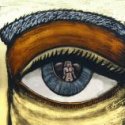
06.28.16 (Sivan 22, 5776) Our Torah portion this week (i.e., Shelach) is a "heavy one" since it focuses on the Sin of the Spies and the subsequent failure of the people to trust that God would care for them. The people's lack of bittachon in God is the most serious sin recorded in all the Torah, even more serious than the sin of the Golden Calf. This is confirmed by the testimony of the New Testament, which presents the fate of the Exodus generation as the dire warning of apostasy for those who claim to follow the Messiah (Heb. 3:7-4:2).
Notice, however, that in order to trust God, you must believe that you are valuable to Him and that He genuinely desires relationship with you. God redeemed you so you could know and love Him. In this connection it is important to notice that the spies said, "we were in our eyes like grasshoppers" (Num. 13:33). They felt small because they had forgotten the reason for their redemption - they had forgotten how much they meant to God. Their lack of self-respect made them feel unworthy of the inheritance. The sin of the spies was not simply that they doubted they could overcome the "giants in the land," but rather that they were worthy people in God's eyes... Sadly the spies view of themselves was more real to them than God's view of them, and that is why they added, "and so we were (like grasshoppers) in their eyes." From a spiritual point of view, this was profoundly tragic...
One lesson we can learn from the unbelief of the spies is that we must be careful to esteem ourselves properly. We are created b'tzelem Elohim (in the image of God), and that is the starting point for everything else revealed in the Torah. This foundational idea may be expressed as "respect precedes Torah." Self-esteem and self-worth are very important characteristics because they enable the soul to receive the Word of God. This isn't a selfish, narcissistic type of love. If you have no self-worth, then it is likely you will believe the promises of Scripture are for other people, but not for you. You will regard yourself as an "outsider" or "alien" who is without promise of inheritance. So we have to begin there, with the fact that God created you in His image and therefore you are of infinite value. You matter to God - and therefore you must respect yourself. It is no mark of holiness to shame or belittle yourself - notwithstanding your sinful nature - since you have a duty to honor yourself as one of God's created children. Dishonoring yourself violates the central ethical commandment of the Torah: "You shall love your neighbor as yourself" (Lev. 19:18). How can you respect others if you don't respect yourself? You will regard yourself as "insect like" and will tend to view others as "gigantic" threats; you will act defensively and walk in fear of other people.... This is the path of a person living in a prison of fear, and it is a type of hell. Trusting in God's personal love for you presupposes that you are worthy to be loved and that there is a divine inheritance for you. This gives you real courage to go take possession of the land as its rightful heir. Trusting in God means regarding God's view of you as more real than your own. It means allowing yourself to be "drawn close" so that you can be in a genuine love relationship with your Heavenly Father. "From now on, therefore, we regard no one (including ourselves) according to the flesh..." (2 Cor. 5:16).
We "walk by faith, not by sight," which means we must take hold of the promise of God, even in a world that "devours its inhabitants" and that is filled of seemingly invincible giants... Faith believes the possible, even in moments of testing and struggle. As Yeshua said, "All things are possible for the one who believes" (Mark 9:23).
For more see: "Small in our Eyes: Further thoughts on parashat Shelach Lekha."
 |
Seeing with Heart...

[ The following concerns this week's Torah reading, parashat Shelach Lekha. Please read the Torah portion to follow the discussion here... ]
06.27.16 (Sivan 21, 5776) "We walk by faith, not by sight." This is true for all people, since every soul lives by faith of some kind or another. Our Torah portion this week (Shelach) begins with the episode of the spies and concludes with the warning not to "spy after your heart and after your eyes" (Num. 15:39). The Torah mentions the heart first and then the eyes to indicate that the eyes follow the heart. We see as we believe with our heart: "According to your faith be it done unto you." When the spies said, "We are not able to go up (לא נוּכַל לַעֲלוֹת)... for they are stronger than us" (Num. 13:31), they revealed their unwillingness to believe in God's promise, or, to put it another way, they revealed their faith in God's inability to deliver on his word.... Indeed, the Hebrew word for "than us" (מִמֶּנּוּ) can also mean "than Him," suggesting that the spies believed that even God would be unable to uproot the Canaanites. According to their faith, so it was done; by believing that it was impossible, they lost the possibility of God's promise...
Faith sees what is possible and refuses to yield to the artificiality of mere appearance. Indeed, appearances are often a test of our courage. We may never know how often a test was given and - just before victory was manifest - the heart grew faint and was lost to fear. "According to your faith be it done to you" is a spiritual principle that applies to everyone. In that sense, it is not that we have faith that matters (since we all do), but whether our faith is grounded in the promises and power of the LORD God of Israel, or something else....
אָמַרְתְּ לַיהוָה אֲדנָי אָתָּה
טוֹבָתִי בַּל־עָלֶיךָ
a·mart · la·do·nai: · A·do·nai · at·tah
tov·va·ti · bal - a·ley·kha

"I say to the LORD, "You are my Lord;
I have no good apart from you."
(Psalm 16:2)

Hebrew Study Card
Faith and Testing....

06.26.16 (Sivan 20, 5776) From our Torah this week (Shelach Lekha) we read: "They (the spies) returned... and brought word and showed them the land's bounty. And they said, "We came to the land to which you sent us. It flows with milk and honey (זָבַת חָלָב וּדְבַשׁ), and this is its fruit. Nevertheless the people who inhabit the land are powerful; the cities are greatly fortified, and we also saw the (giant) people of Anak there... We are unable to go up against the people there, for they are stronger than we are ... and moreover the land itself consumes its inhabitants" (Num. 13:25-32). The Kotzer rebbe asked, "Did the spies lie? Did they invent words that were untrue? Behold, they spoke as they saw it, so how did they sin?" Yet not everything that is not a lie is truth: you may have all the facts "correct" and yet still speak untruth. Truth is therefore more than the description of appearances, since what appears is constrained by what is ultimately real. Our Torah portion again illustrates the responsibility we have to trust in the good, regardless of whatever momentary obstacles and troubles we may be presently encountering...
The knowledge of God is not like that obtained by laboratory science. Empirical data is based on logical induction, repeatability, and assumes that cause and effect relationships hold. However, the scientific method itself assumes (without empirical proof) far more basic things, for example, that the external world exists; that the future will resemble the past; that measurement is possible and "maps" to an external reality; that causal connections are valid, and so on. The scientific method further assumes other philosophical axioms that transcend the paradigms of the laboratory, for instance, that is better to know than to not know, that knowledge itself is possible, that beauty (i.e., symmetry, elegance, and deduction) are "good" aspects of theory, and so on. God gives witness by means of "argumentum spiritus sancti," the witness of the Holy Spirit, inner revelation that comes to the heart of faith.
But what about the trouble, testing, pain, hardship in our lives? How do we deal with these without losing heart? Only God can help us, friend... In this life, where our "outer man perishes" we will experience the "existential pathos" of the life of faith. That is the test. We may feel abandoned by God, or forgotten, or of complete insignificance, or sinful, vile, hopeless confused, and so on, and yet the heart of faith cries out: "Though he slay me, yet will I trust in him" (Job 13:15). Faith is able to see beyond the temporal to the eternal... It finds comfort in God's blessing to endure the ambiguities of this world. May the LORD God Israel, Yeshua our Messiah, strengthen our faith in Him. Amen.
 |
The Great Warning...

06.26.16 (Sivan 20, 5776) Our Torah reading for this week, Shelach Lekha (שלח־לך), recounts how Moses sent twelve spies from the region of Kadesh into the land of Canaan to search it out and give a report of its condition. The spies returned 40 days later extolling the land, saying that was indeed fruitful and zevat chalav u'devash (זָבַת חָלָב וּדְבַשׁ), "flowing with milk and honey." However, ten of the spies also gave a discouraging report, indicating their lack of confidence that the people could conquer the land. Only Joshua (יְהוֹשֻׁעַ) and Caleb (כָּלֵב) kept faith in God's promise. Upon hearing the report of the ten spies, however, the people rebelled and cried out to return to Egypt. Angered by their lack of faith, God sought to destroy the people, but Moses interceded on their behalf. The LORD then decreed to lengthen the Israelites' wandering in the desert to 40 years -- one year for each day the spies were in the land. All of the faithless generation of the Exodus over the age of 20 would die in the desert, except for Joshua and Caleb, the two spies who kept faith with the LORD. After hearing the judgment of God, a group of remorseful Israelites decided to "repent" by taking matters into their own hands. Without either the "Ark of the Covenant of the LORD" or Moses' leadership, they presumptuously decided to storm a mountain on the border of land, but were decisively routed by the Amalekites and Canaanites.
If last week's Torah was "sefer kvetch" (the book of complaint), this week's Torah reveals the fateful outcome... The people's lapse of faith in God's power serves as a profound and very sober warning, and indeed is a primary warning regarding the dreadful sin of unbelief in the New Testament (see Heb. 3:7-4:11). Indeed, Jewish tradition states that the decree that "none of the men who had seen my glorious Presence and my signs I performed in Egypt and in the desert will see the land that I swore to give to their fathers" (Num. 14:22-23) was given on the Ninth of Av (i.e., Tishah B'Av), and was prophetic of the destruction of the Temple and the worldwide exile of the people from the Promised Land.
Note: The tragedy of the sin at Kadesh ultimately has a happy ending, however, since the LORD is never thwarted by man's sin and weaknesses. After the 38 years of exile were complete, Moses' successor Joshua sent a second spying expedition to the promised land, though this time God led the spies to a prostitute named Rahab (רָחָב), a direct ancestor of Yeshua the Messiah, who later identified her faith in the LORD's victory by displaying the scarlet cord (חוּט הַשָּׁנִי) during the fall of Jericho (Joshua 2). Rahab was the (grand)mother of Boaz, who later married Ruth, the great grandmother of King David. May God likewise give us courage to walk in the power of His promises, even if our present circumstances seem daunting. May the LORD clothe each of us with the "spirit of David" to stand before all the giants of the land who defy the LORD and His power.
Contentment's Great Gain...

06.24.16 (Sivan 18, 5776) Friends, let us ask the LORD to give us hearts that are full of godly contentment, which is "of great gain" (1 Tim. 6:6). May we be walking in true spirituality (רוּחָנִיּוּת) - in the power of the Holy Spirit (רוּחַ הַקּדֶש) - by practicing emotional honesty with ourselves and with God (James 5:16). Trials and tribulations - the "squeezing of grapes" - are part of the walk of faith, but we are invited to come "boldly" before the Throne of Grace (παρρησίας τῷ θρόνῳ τῆς χάριτος) to find help for our lives (Heb. 4:16). Note that the word translated "boldly" in this verse (παρρησίας) means that we can speak honestly and freely to God from the center of the chaos of our hearts -- without fear or shame. We don't need to conceal ourselves from the Divine Light, since this is the very Light that overcomes the hidden darkness within us. Those who accept that God is in complete control of their lives are set free from the terrible burdens of fear and anger. Abiding in the truth of ahavah shlemah (אַהֲבָה שְׁלֵמָה, God's "perfect love") means that you can let go...
יֵצֶר סָמוּךְ תִּצּר שָׁלוֹם שָׁלוֹם כִּי בְךָ בָּטוּחַ
בִּטְחוּ בַיהוָה עֲדֵי־עַד כִּי בְּיָהּ יְהוָה צוּר עוֹלָמִים
ye·tzer · sa·mukh · titz·tzor · sha·lom · sha·lom · ki · ve·kha · ba·tu·ach
bit·chu · vadonai · a·di-ad · ki · be·Yah · Adonai · tzur · o·la·mim

You will keep him in perfect peace whose mind is stayed on you, for he trusts in you.
Trust in the LORD forever, for Yah the LORD is an everlasting rock.
(Isa. 26:3-4)

Hebrew Study Card
The Name of the LORD is "I-AM-WITH-YOU-ALWAYS" (אני איתך תמיד), which implies that we always live within God's Presence and care, even if we are sometimes unconscious of this truth (Matt. 28:20). The Heart of God cries out, "Behold I have engraved you on the palms of my hands" (הֵן עַל־כַּפַּיִם חַקּתִיךְ; Isa. 49:16). Remember the One who stretched out his hands and died for your healing; remember that he said, "Do not be anxious about tomorrow... sufficient for the day is its own trouble" (Matt. 6:34). Again, "do not be anxious for any reason, but in everything by prayer and supplication with thanksgiving let your requests be made known to God, and the healing peace of God (שְׁלוֹם אֱלהִים) - the very shalom of heaven which surpasses all understanding - will guard your hearts and your minds in Yeshua the Messiah" (Phil. 4:6-7). "He's got the whole world in his hands," and we experience inner peace when our minds are settled on Him (Isa. 26:3).
Seeking what Matters...

06.24.16 (Sivan 18, 5776) Our Torah portion this week (Beha'alotekha) recounts the rebellion of the people during the desert sojourn... Instead of joyfully anticipating the promise of their inheritance, the people grew dissatisfied and bored. The Sefat Emet noted that just after we read how the people complained bitterly to the LORD, they had a "strong craving" (הִתְאַוּוּ תַּאֲוָה), which in Hebrew literally means they "craved a craving." Moses could tolerate the people's desire for food and water, but when they began to actively cultivate their cravings, lusting after the imaginary "free fish" they enjoyed in Egypt, he began to realize that the problem was deeper, a matter of the heart... Moses understood that what the people really wanted was impossible, since it involved denying who they were as God's redeemed people. The issue was not about wanting "meat" to eat, after all, but rather hungering after the forbidden, desiring to desire, etc. Creating desires, fomenting a sense of deprivation, and choosing to see yourself as a victim, is a lethal sickness of spirit, a disease of the soul. It is a "burning" (i.e., Taberah: תַּבְעֵרָה) that destroys inner peace. May God help us understand and seek what truly matters; may he deliver us from self-destruction; and may he help us to be satisfied with the manna he provides! Amen.
Note: For more on this topic, see "Graves of Craving: Further thoughts on Beha'alotekha."
 |
The Way of Suffering...

06.23.16 (Sivan 17, 5776) "For I will show him how much he must suffer for the sake of my Name" (Acts 9:16). Far from offering wealth, prosperity, and a life of happy ease, following Yeshua is the way of suffering and struggle in this world. As it is attested in our Scriptures: "We must suffer many tribulations to enter the kingdom of God" (Acts 14:23). Indeed suffering is the way of the prophets, the psalmists, and especially the way of the Lord our Savior, who endured the agony of death upon the cross to redeem us to eternal hope (Heb. 2:10). Persecution – being ostracized, "despised and rejected of men," and experiencing the pain of rejection - is inextricably bound to the truth of the gospel (2 Tim. 3:12). The message of the cross is an offense to the world's pride and therefore the devices of the carnal ego will always seek to silence it. Indeed, even our own inner struggle with evil is a suffering wherein we learn despair over ourselves, teaching that only God can truly save us from ourselves. Nevertheless "in all these things" we are more than conquerors through Him that loved us (Rom. 8:37). But what things are these except tribulation, distress, persecution, suffering, and inner struggle? Suffering is part of God's plan – the "loss of all things" so that we may come to know the power of the resurrection (Phil. 3:10). There is a "shared cup" of suffering for those who will walk in the redemptive mission of Yeshua (Col. 1:24).
The tests and struggles of faith remind us of the principle: gam zu l'tovah (גַּם זוּ לְטוֹבָה), "this too is for the best" (cp. Rom. 8:28). Notice, however, that the principle is not stated, gam zu tovah - "this is the best," but rather gam zu l'tovah - "this, too, is for the best." The little preposition here (-ל) is crucial. The heart of faith does not affirm that "whatever happens, happens" and therefore we should passively accept the injustices and pain of life without any form of protest. Unlike some religions, the LORD God of Israel does not demand slavish "submission" to His will, much less does He desire "karma-like" indifference to the suffering we see in the world (Phil. 2:4; 1 Pet. 5:7; Heb. 4:16, James 4:9, etc.). Having faith that God will one day "wipe away every tear" does not deny the existence of evil nor does it suppress real tears from being shed; however, genuine faith affirms that real (existential) comfort is coming, and that sadness, pain, and suffering will not be given the last word....
Faith (i.e., emunah) is a "double movement" of the heart. It both "sees what is invisible" (2 Cor. 4:18) and understands (i.e., accepts) that the "present form of this world is passing away" (1 Cor. 7:31). Faith rests in God's providential hand over the chaos and flux of creation. The eye of faith beholds the Presence of God and His reign over all the mundane affairs of this world. Indeed, it is only by fixing our hope upon the eternal that we are enabled to rightly apprehend the nature of the temporal world itself. In fact, the word emunah (אֱמוּנָה) shares the same root as the Hebrew word for truth (אֱמֶת). In that sense, "seeing what is invisible" (τὰ μὴ βλεπόμενα) is a more fundamental type of "seeing," since the truth of hope ultimately interprets all other ways of seeing...
Emunah therefore understands temporal suffering as part of the greater purposes of God in the world. It sees beyond the painful moment and trusts that God is "busy putting all the pieces together." Everything has a reason, and that includes the seemingly trivial as well as the obviously tragic. The life of emunah calls us to live as toshavim (תוֹשָׁבִים) - sojourners - who are put at a "distance" from the world of appearances. Faith leads to a form of divine "homesickness," a cry of protest over the state of this world and its evils, and a gnawing hunger for love and truth to prevail in the world. By itself, emunah would die of intolerable heartache were it not for the gift of God's comfort.
Yes, we are given consolation and comfort from heaven, since the Scriptures describe God as Av Ha-Rachamim (the Father of mercies) and the God of all comfort: "Blessed be the God and Father of our Lord Yeshua the Messiah, the Father of mercies and God of all comfort, who comforts us in all our affliction, so that we may be able to comfort those who are in any affliction, with the comfort with which we ourselves are comforted by God" (2 Cor. 1:3-4). Note that Paul links our present suffering (πάθος, pathos) with a divinely imparted comfort (παράκλησις, "paraklesis"), which he regards as a state of blessedness. God Himself "calls us to His side" (from παρά + καλέω) in the midst of our afflictions and pain.... The Greek text reads, ὁ παρακαλῶν ἡμᾶς ἐπὶ πάσῃ τῇ θλίψει ἡμῶν, and might be better rendered as, "The one calling to us [to His side] in all our tribulations" (2 Cor. 1:4). God doesn't want us to go through pain by ourselves, all alone. He invites us to come to His side for comfort... Yesh ohev davek me'ach: "There is a lover who sticks closer than a brother" (Prov. 18:24b).
The purpose of our afflictions is to learn to let go of what we value in the world in order to attain to a better hope. טוֹב־לִי כִי־עֻנֵּיתִי לְמַעַן אֶלְמַד חֻקֶּיךָ / "It was good for me that I was afflicted, that I might learn your statutes" (Psalm 119:71). God calls out to us in our tribulations so that we may turn away from our illusions and seek refuge in His Presence. Suffering is a tool that only God has the wisdom to use as a means of blessing in our lives.
There is an "eschatological" aspect to suffering for the person of genuine faith. Present suffering will ultimately be redeemed and transformed as "soul-building," but this does not mean that we should act Stoically or admonish others to suppress their heartache. If one of us hurts, so does the rest of the body (1 Cor. 12:26). This isn't sanctimonious humbug; there's no "double talk" going on here. The most succinct verse in the New Testament on this subject is but two words: "Jesus wept" (John 11:35). Nonetheless, we can find great comfort by heeding the voice of pain as a disguised message from God. God calls to us in all our tribulations so that we might make our refuge in Him.
 |
Bread of Affliction...

06.23.16 (Sivan 17, 5776) Just as God humbled Israel with manna in the desert, so He humbles us. "Give us this day our daily bread and deliver us..." The purpose of affliction is ultimately good and healing: God humbles us with manna, the "bread of affliction, so "that he might make you know that man does not live by bread alone, but man lives by every word that comes from the mouth of the LORD" (Deut. 8:3). In other words, God uses tzuris to lead us to do teshuvah and accept the truth. We often pray that our problems be taken away, but God sometimes ordains these very problems so that we will turn and draw near to Him... We are being weaned from this present age to be readied for heavenly glory, for things unimaginably wonderful, soon to be revealed to you. Stay strong in the Lord, friends.
Resurrection and the Life...
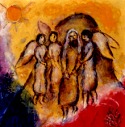
06.23.16 (Sivan 17, 5776) Despite this shadowy world of constant change, decay, heartache, and physical death, Yeshua made the astounding claim: "I AM the resurrection and the life (אֲנִי הַתְּחִיָּה וְהַחַיִּים); whoever believes in me, though he die, yet shall he live, and everyone who lives and believes in me shall never die. Do you believe this?"
אֲנִי הַתְּחִיָּה וְהַחַיִּים
הַמַּאֲמִין בִּי יִחְיֶה גַּם אִם יָמוּת
וְכָל מִי שֶׁחַי וּמַאֲמִין בִּי לא־יָמוּת לְעוֹלָם
הַאִם מַאֲמִינָה אַתְּ בָּזֶה
a·ni · ha'te·chi·yah · ve'ha·chai·yim
ha·ma·a·mim · bi · yich·yeh · gam · im · ya·mut
ve'khol · mi · she'chai · u·ma·a·min · bi · lo · ya·mut · le'olam
ha·im · ma·a·mi·nah · at · ba·zeh?

"I am the resurrection and the life.
Whoever believes in me, though he die, yet shall he live,
and everyone who lives and believes in me shall never die.
Do you believe this?" (John 11:25-26)

So let me ask you plainly -- and in the midst of your own struggle with suffering -- whether you do indeed believe that Yeshua is the Healer of your existence, even in the face of your own physical death? If not, then what are you hoping for when your hour of inevitability comes? Are you looking to your own merit to secure favor in heaven? Are you hoping your soul will be absorbed into the universal, delivered from the pain of the ego? Or are you hoping for a "good verdict" before God on the day of judgment? Are you looking to Moses or some other prophet or saint to intercede on your behalf? Who are you trusting to be there for you on the other side of the veil? Who do you say that Yeshua is? (Luke 9:20)?
Faith in the Unseen Good...
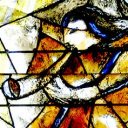
[ The following is related to this week's Torah reading, parashat Beha'alotekha... ]
06.22.16 (Sivan 16, 5776) From our Torah portion this week (i.e., Beha'alotekha) we read: "At the command of the LORD they camped, and at the command of the LORD they set out" (Num. 9:23). This teaches us that God's Name is to be heeded every step of the way. Whenever we journey someplace, near or far, we say, "be'ezrat Hashem ('with God's help') I am going to this place, and I will stay for so long, im yirtzeh Hashem ('if it pleases God')." As James the Righteous reminds us, "You do not know what tomorrow will bring. For what is your life? You are a mist that appears for a little time and then vanishes (James 4:14-15). "Man is like a breath; his days are like a passing shadow" (Psalm 144:4). We share exile with the LORD in this age, as strangers and sojourners with Him; indeed, our lives are hidden with Him, waiting to be revealed (Col. 3:1-4). "The present form (τὸ σχῆμα) of this world is passing away" (1 Cor. 7:31), and the heart of faith looks for a city whose designer and builder is God Himself (Heb. 11:10). "So we do not lose heart... For the things that are seen are turning to dust, but the things that are unseen endure forever" (2 Cor. 4:16-18).
בְּטַח אֶל־יְהוָה בְּכָל־לִבֶּךָ
וְאֶל־בִּינָתְךָ אַל־תִּשָּׁעֵן
בְּכָל־דְּרָכֶיךָ דָעֵהוּ וְהוּא יְיַשֵּׁר ארְחתֶיךָ
be·tach · el · Adonai · be·khol · lib·be·kha
ve'el · bi·na·te·kha · al · tish·a·en
be·khol · de·ra·khe·kha · da·ei·hu · ve·hu · ye·ya·sher · or·cho·te·kha

"Trust in the LORD with all your heart,
and do not lean on your own understanding.
Know Him in all your ways, and He will straighten your paths."
(Prov. 3:5-6)

Hebrew Study Card
"Know Him in all your ways," that is, in all that you put your hand to do look for the Divine Presence and guidance (1 Cor. 10:31). As King David stated, "I have set the Lord always before me, because He is at my right hand, I shall not be moved" (Psalm 16:8). The very first step of the journey is to find hope...
Refusing Offense...
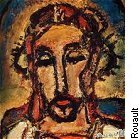
06.22.16 (Sivan 16, 5776) People today are quick to take offense, made prisoners of their own insecurities... Ironically, the more you seek your own honor, the less you'll find. Turn yourself around; get out of yourself: "Whoever exalts himself will be humbled, and whoever humbles himself will be exalted." "If anyone would be first, he must be servant of all" (Mark 9:35). "And blessed is the man who is not offended" (וְאַשְׁרֵי הָאִישׁ אֲשֶׁר לא־יִכָּשֵׁל).
The devil (and his political advocates in this world) seeks to "divide and conquer" people by emphasizing what makes them different. He creates fear to manipulate and terrify others. He seeks to sow seeds of mistrust, suspicion, and hatred based on fear and ignorance. We must fight the power of the lie by means of the truth of the LORD God Almighty. All people are created be'tzelem Elohim (בְּצֶלֶם אֱלהִים), intended to be image-bearers of the Divine, and each soul will give account for its life – for every careless thought, word, and deed. As it is written, "No creature is hidden from his sight, but all are naked and exposed to the eyes of him to whom we must give account" (Heb. 4:13). Refuse, therefore, to take offense over anything - over perceived insults, over attacks on your character, and especially over the news (i.e., propaganda) of this evil world, friends. All things come from the hand of God to test you; to refine what is in your heart... Give up your personal "rights" and surrender yourself to the providential care of your Heavenly Father. But regarding the affairs of this world, understand that the nations are tohu (תהוּ), "confusion and unreality" (Isa. 40:17), and the schemes of worldly men are ultimately doomed (Psalm 1:6). Ein od milvado: Understand that the LORD God Almighty is the great King over all the earth (Psalm 47:7).
 |
The Armor of Light...

06.22.16 (Sivan 16, 5776) At the risk of repeating myself, let me remind you that we are in the midst of a great spiritual war -- the war for the truth. This has been the battle from the beginning. The very first recorded words of the nachash (הַנָּחָשׁ) questioned God's truth: "Did God really say...?" (Gen. 3:1). In the end there will be found two types of people: those who love the truth and those who love the lie; these are children of light (בְּנֵי הָאוֹר) and children of darkness (בְּנֵי הַחשֶׁךְ), respectively. Followers of Yeshua the Messiah are told to "walk as children of light" / ὡς τέκνα φωτὸς περιπατεῖτε (Eph. 5:8). Children of light are called to be am kadosh - a holy people - separate from the evil engendered by the fallen world and its forces, just as the very first creative expression of God was the separation of light from darkness (Gen. 1:3-4). The children of light "hate evil and love the good," and conversely, the children of darkness "hate the good and love evil" (Psalm 34:21, Prov. 8:13, Amos 5:15, John 3:20-21). Yes, we hate sin, because it separates people from healing; we hate sin because we love others. We are to walk in the peace and love of God; to do acts of justice and lovingkindness (Psalm 97:10). "No one can serve two masters, for either he will hate the one and love the other, or he will be devoted to the one and despise the other."
Surely our great need is to have heart, to find strength, resolution, and steadfast determination to walk boldly during these heartless and depraved days (2 Tim. 3:1-5). We are not without God's help, of course. Yeshua told us that the Ruach HaKodesh (רוּחַ הַקּדֶשׁ) would be "called alongside" (παράκλητος) to comfort us on the journey. The English verb "comfort" literally means "to give strength" (from com- ["with"] and fortis ["strong"]), an idea similarly expressed by the verb "encourage," that is, to "put heart [i.e., 'core'] within the soul." In Hebrew, the word courage is expressed by the phrase ometz lev (אמֶץ לֵב), meaning "strong of heart," denoting an inner quality of the will rather than of the intellect. Our faith is the victory that overcomes the world (1 John 4:4, 5:4).
May we always focus on Yeshua, the Light of Torah and the true Wisdom of God: "Whoever has My commandments (מִצְוֹתַי) and keeps them, that is the one who loves me. And the one who loves me will be loved by my Father, and I will love him and will manifest (lit., "shine within" from ἐν, "in" + φαίνω, "shine") myself to him" (John 14:21). There it is - the Source of the Light that overcomes all darkness; the Power that is behind the armor of God... Yeshua is the Beginning, the Center, and the End of all true meaning from God.
 |
Tending to the Light...
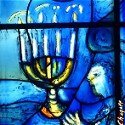
[ The following is related to this week's Torah reading, parashat Beha'alotekha... ]
06.21.16 (Sivan 15, 5776) In our Torah for this week, God gave instructions about how Aaron was to light the lamps of the menorah within the inner chamber of the Tabernacle. Each day Aaron was to clean each of the seven lamps and to refill them with the very purest olive oil. The wicks were then to be bent or positioned so that the six outer lamps projected their lights toward the seventh (and central) shaft. The lamps of the menorah were to be lit daily, "from evening until morning," in a specific sequence - starting from the central lamp (the shamash) and then moving right to left (Exod. 27:21).
The Hebrew word beha'alotekha (בְּהַעֲלתְךָ) literally means "when you raise up" (from alah: עָלָה, "to ascend"), which in this context refers to the flames of the menorah kindled by God's priest. The sages say that the Torah uses this Hebrew word to imply that the daily lighting and tending of the menorah was an act of sacrificial worship (like an olah offering). Indeed, Aaron's service of lighting the menorah was entirely spiritual, symbolizing how the light of the heavenly realm is manifest in this world. By extension, we also "raise up the lamps" by acting in faith, that is, by opening our eyes to believe in and to receive the Divine Light of the World. We "tend to the flame" by caring for God's light and honoring the Shekhinah Presence. As we serve God by faith, we bear witness to the light of truth before others. As Yeshua said: "Let your light shine before others, so that they may see your good works and give glory to your Father who is in heaven (Matt. 5:16).
 |
The Inner Torah...

06.21.16 (Sivan 15, 5776) Strictly speaking the content of the Ten Commandments, from a moral perspective, presented no new revelation, since sacred Reality is intuitively understood within every created soul (see Gen. 1:27; John 1:9; Acts 17:24-28). As it is written, "The wrath of God is revealed from heaven against all ungodliness and unrighteousness of men, who suppress (i.e., hold down: κατέχω) the truth by their unrighteousness, because that which can be known about God is evident within them, for God has revealed it to them" (Rom. 1:18-19). Where Paul says, "against all ungodliness" he refers to our universal duty before the Living God (בֵּין אָדָם לָמָקוֹם); and likewise "all unrighteousness," refers to our universal duty toward other people (בֵּין אָדָם לְחֲבֵרוֹ). The "invisible things of God are seen" so vividly that people are "without excuse" (ἀναπολόγητος) for their evasion and rejection of the Divine Presence, which constitutes a disposition of rebellion, treason, and willful desecration of the sanctity of life (Rom. 1:20). The deeper revelation given at Sinai, however, was not an elaborate lawcode but something else, namely, the solution for the problem of spiritual death as prefigured in the Altar of the Tabernacle and the daily sacrifice of the lamb (i.e., korban tamid: קָרְבַּן תָּמִיד; Num. 28:1-8). "The people stood far off, while Moses drew near to the thick darkness where God was" (Exod. 20:21). The onlookers saw the outer, the imposing, the threatening, and this made them distant, but Moses entered the inner region and was given the vision of the altar (Exod. 25:9; John 5:46-47; Heb. 8:6). Likewise Yeshua did not come to be a moral teacher of the law but to bear the penalty of our lawlessness (2 Cor. 5:21; Gal. 3:13). Our Savior died upon the cross shrouded in complete darkness, yet entering the inner region reveals God's passion offered up for you (Luke 23:44-45).
 |
Delighting in Torah...
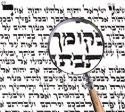
06.21.16 (Sivan 15, 5776) The Scriptures declare: "Blessed is the man who ... delights in the Torah of the LORD (בְּתוֹרַת יְהוָה); all that he does shall prosper" (Psalm 1:1-3). And while it is true that we are no longer 'under' the constraints of the former covenant given at Sinai (Rom. 3:20-28), we are repeatedly instructed to delight in the Torah and to meditate on its precepts day and night (Josh 1:8, Psalm 1:2; 19:8; 119:15, 47, 97; Neh. 8:12, etc.). As it is written in Proverbs: "If you seek it [i.e., the wisdom revealed in the Torah] like silver and search for it as for hidden treasures, then you will understand the fear of the LORD and find the knowledge of God" (Prov. 2:4-5). Indeed, the New Testament says that the "the Torah is holy, and the commandment is holy and righteous and good" (Rom. 7:2), and where it is written, "all Scripture is breathed out by God and is profitable for teaching, for reproof, for correction, and for training in righteousness" (2 Tim 3:16-17), it is evident that the Jewish Scriptures (i.e., the Torah, the Prophets, and the Writings) are meant, since they provide the foundation, context, and the overarching matrix for the later New Covenant revelation... And of course these were the Scriptures Yeshua used to explain his ministry to his followers: "And beginning with Moses and all the Prophets, he interpreted to them in all the Scriptures the things concerning himself" (Luke 24:27; John 1:45). In other words, the Torah has both a logical, a linguistic, and a theological priority for understanding the New Testament Scriptures, and the failure to read in context invariably leads to faulty interpretations and doctrinal errors of various kinds. God "breathed out" (θεόπνευστος) his revelation in order, and the message itself must be understood in light of that order (Gal. 4:4-5).
מָה־אָהַבְתִּי תוֹרָתֶךָ
כָּל־הַיּוֹם הִיא שִׂיחָתִי
mah · a·hav·ti · to·ra·te·kha
kol · ha·yom · hi · si·cha·ti

"Oh how I love your Torah;
It is my meditation all the day."
(Psalm 119:97)

Hebrew Study Card
This verse begins the "Mem section" of the Psalm 119 acrostic. Mem is the letter of "water" (mayim), symbolizing the "spring" of the Torah. In traditional soferut (scribal arts), the letter Mem (מ) is formed from two parts: a Vav (ו) and a Kaf (כ), the gematria of which equals 26, the same value for the sacred Name YHVH (יהוה). The Torah (תּוֹרָה) is central to the revelation of the LORD, just as Yeshua is forever "the Voice of the Living God speaking from the midst of the fire" (Deut. 5:26, Matt. 17:1-3).
Walk in the Light...

06.21.16 (Sivan 15, 5776) The emotion of fear profoundly affects the way the brain processes images, experiences, and messages. Fear colors the way we see and hear things. And since the mind and body are intricately interconnected, fear is a root cause of many physiological problems such as heart disease, high blood pressure, clinical depression, and many other ailments. Indeed, left unchecked, fear can be deadly....
Most of our negative emotions come from fear, including anger, frustration, and rage. On a spiritual level, fear and worry can cause people to question God's love, to doubt His promises, and to succumb to despair. The devil knows that frightening people causes them to be unsettled, off-balance, and vulnerable to all sorts of manipulation and deception. Indeed logicians call illegitimate appeals to fear the "appeal to the stick" (argumentum ad baculum). When someone plays on your fears, it's wise to discern whether there's any basis in Reality for the supposed threat, or if the appeal is simply a rhetorical "scare tactic" intended to persuade you to accept some sort of conclusion. Unscrupulous people (such as advertisers and especially politicians) regularly use fear to manipulate public opinion, of course, and they're only too glad to tell you exactly what you should fear. They are delighted to prey upon your anxieties and then offer you a supposed "remedy."
Living in fear is a form of slavery (Heb. 2:15), but where the Spirit of the LORD is there is liberty and peace (2 Cor. 3:17). Therefore "fear no evil," for God is with you (Psalm 23:4). There is no fear in God's love, but perfect love (אַהֲבָה שְׁלֵמָה) throws out fear (1 John 4:18). The LORD repeatedly tells us not to be afraid – not of man, nor of war, nor of tribulation, nor even death itself (Rom. 8:35-39). Indeed, one of the most frequent commandments in Scripture is simply al-tirah (אַל־תִּירָא), "Be not afraid."
אַל־תִּירָא כִּי עִמְּךָ־אָנִי אַל־תִּשְׁתָּע כִּי־אֲנִי אֱלהֶיךָ
אִמַּצְתִּיךָ אַף־עֲזַרְתִּיךָ אַף־תְּמַכְתִּיךָ בִּימִין צִדְקִי
al ti·ra ki im·me·kha a·ni; al tish·ta ki a·ni E·lo·he·kha
im·matz·ti·kha af a·zar·ti·kha, af te·makh·ti·kha bi·min tzid·ki

"Fear not, for I am with you; be not dismayed, for I am your God;
I will strengthen you, I will help you, I will uphold you with my righteous right hand."
(Isa. 41:10)

Download Study Card
Take comfort that your Heavenly Father sees when the sparrow falls; he arrays the flower in its hidden valley; and he calls each star by name. More importantly, the Lord sees you and understands your struggle with fear... Bring to Him your needy heart and trust in His provision and care... As we look to Him, our fears will begin to melt away...
Light of the Servant...
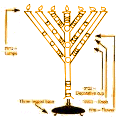
[ The following is related to this week's Torah reading, parashat Beha'alotekha... ]
06.20.16 (Sivan 14, 5776) Our Torah portion this week begins with the LORD instructing Aaron to kindle the seven lamps of the menorah (מְנוֹרָה) so that the light from each would be "turned" toward its central shaft (Exod. 25:37; Num. 8:4). The entire menorah was formed mikshah (מִקְשָׁה), that is, beaten from a single piece of pure gold (זָהָב טָהוֹר), and its base, shaft, branches, cups, fruits, and flowers were all "one" with its substance (Exod. 25:31). The central shaft upheld the light of the shamash (servant or helper lamp) which also served as the trunk for the other branches. The radiance of the menorah symbolized the Divine light (shamash can also be read shemesh, "sun"), which is the radiance of Yeshua, the Tree of Light and the great Servant of the LORD (John 8:12; 1 John 1:5). Yeshua is the light that gives light to every person created in the image of God (John 1:9). Our spiritual life stems from our connection with Him, since he provides us with support, sustenance, and illumination from the oil of the Holy Spirit (John 15:1-5)..
Yeshua is the Light of the LORD (אוֹר יי). As it is written, "God is our light and our yeshuah, our salvation" (Psalm 27:1; 1 John 1:5). He alone is the Light of the world (אוֹר הָעוֹלָם), the Shamash (שַׁמָּשׁ) who descends to ignite the "light of life" (אוֹר הַחַיִּים) within all who will believe. Our Savior is the Radiance (זוֹהַר) of the glory of God (Heb. 1:3), the Fire of God's holy countenance. The one who has the Son has life, but the one who refuses this life is spiritually dead. May we all walk in the Light of His countenance; "O house of Jacob, come, let us walk in the light of the LORD" (Isa. 2:5).
בֵּית יַעֲקב לְכוּ וְנֵלְכָה בְּאוֹר יְהוָה
bet · Ya·a·kov · le·khu · ve·nel·khah · be·or · Adonai

"O house of Jacob, come, let us walk
in the light of the LORD"
(Isa. 2:5)

Note: For more on the mystery of the menorah, see "The Menorah and the Tree of Life."
The Divine Light...
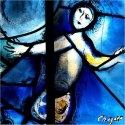
[ The following is related to this week's Torah reading, parashat Beha'alotekha... ]
06.20.16 (Sivan 14, 5776) "If I say, surely darkness covers me ... the night shines as the day; nothing hides from your radiance" (Psalm 139:11-12). We have to trust that God is in our darkness, in the silence, in the unknown... You come out of the shadows when you admit that you act just like other people, that you are human, in need of reconciliation yourself... Above all you need God. You need help. You need a miracle to help you to truly love. You may find excuses for many things, but you cannot escape the "wretched man that I am" reality that is grounded in your fears. God sees in the darkness and is present there, too. When you feel alone, like an unbridgeable gulf lay between you and all that is good; when you feel like you want to scream but are afraid that even then no one would hear, may the LORD shine His light upon you... Amen, may His light shine upon you.
גַּם־חשֶׁךְ לא־יַחְשִׁיךְ מִמֶּךָ
וְלַיְלָה כַּיּוֹם יָאִיר
כַּחֲשֵׁיכָה כָּאוֹרָה
gam · cho·shekh · lo · yach·shikh · mi·me·ka
ve·lai·lah · ka·yom · ya·ir
ka·cha·she·khah · ka·o·rah

"The darkness is not made dark to you;
but the night shines as the day:
as the darkness so is the light...
(Psalm 139:11)

"For it is you who light my lamp; the LORD my God outshines my darkness" (Psalm 18:28). There is "depression," and there is the dark night of the soul, and these are different matters, though they may overlap... "Hope deferred makes the heart sick." The dark night of the soul is an experience of trusting God in the darkness yet has a spiritual direction and end. We walk through this darkness with God and learn from him even there..
Parashat Beha'alotekha - בהעלתך

[ The Torah reading for this coming Shabbat is parashat Beha'alotekha... ]
06.19.16 (Sivan 13, 5776) Our Torah portion this week (i.e., parashat Beha'alotekha) begins with God giving instructions about how Aaron was to service the lamps of the Menorah within the Holy Place of the Tabernacle (Num. 8:1-4). Each day Aaron was to clean each of the seven lamps and to refill them with the very purest olive oil. The wicks were then to be bent so that the six outer lamps shined toward the seventh (and central) shaft. The lamps were to be lit daily, "from evening until morning," in a specific sequence - starting from the central lamp (the shamash) and then moving right to left (Exod. 27:21). According to the Talmud (Shabbat 22b), while all the lamps received the same amount of olive oil, the central lamp miraculously never ran out of oil, even though it was kindled first in the sequence. This miracle is also reported to have occurred during the Temple period, though it abruptly ended about 40 years before the destruction of the Second Temple (c. 30 AD), after the death of Yeshua the Messiah, the true Servant and Branch of the LORD. As it is attested in the Talmud: "Our Rabbis taught: During the last forty years before the destruction of the Temple the lot ['For the Lord'] did not come up in the right hand; nor did the crimson-colored strap become white; nor did the centermost light shine" (Yoma 39a).
The portion then describes how the Levites were to be set apart for service at the Mishkan (Num. 8:5-12). In a ceremony that signified a sort of "rebirth," they were first sprinkled with mei hachatat (מֵי חַטָּאת), literally, "the waters of sin" (Num. 8:7), that is, the water mixed with the ashes of the red heifer that purified from contamination with death (Num. 19:13). Next they shaved off all their hair and were completely immersed in a mikveh (a bath containing flowing water). The steps of being sprinkled with purifying water, shaving off of all the hair, and being completely immersed in a mikveh are similar to the ritual for the cleansing of the metzora, or "leper" (Lev. 14:2-32). Rashi notes that each member of the community was required to place their hands on the Levites' heads, just as the hands were placed on the head of a sacrificial animal as it was slaughtered before the altar (Num. 8:10; Lev. 1:4, 3:2). The "waving" of the Levites by the High Priest likewise simulated the ritual of "tenufah" (תְּנוּפָה), that is, the waving of the guilt sacrifice (asham) offered by the leper after his cleansing (Lev. 14:12). Finally, the Levites themselves were to lay their hands on sin and whole burnt offerings to make atonement before the LORD (Num. 8:12).
For more on this Torah reading, see the Beha'alotekha study pages and the related links. You can download the Shabbat Table talk for this week's reading here:
Shavuah tov, chaverim! May we all make strides to grow in grace and the knowledge of Yeshua our Messiah this week! Amen. And happy Father's Day to all you dads out there!
The Breath of Life....

06.17.16 (Sivan 11, 5776) Torah without Spirit is like a body without soul... As I've mentioned elsewhere on this site, the Name YHVH (יְהוָה) is connected with life-giving Spirit. Before man first came alive, the LORD breathed into him nishmat chayim (נִשְׁמַת חַיִּים), the "breath of life" (Gen. 2:7; Job 12:10). Later, Moses called the LORD Elohei ha-ruchot lekhol basar (אֱלהֵי הָרוּחת לְכָל־בָּשָׂר), which can be translated "the God of the breath of all flesh" (Num. 16:22). Indeed, the name YHVH is unutterable apart from breath, from ruach (רוּח), since each letter represents a vowel or breathing sound. Yeshua breathes out to his followers and says, "Receive the Holy Spirit" (John 20:22). It is the breath of God that breathes into us to make us truly alive. When we open our hearts to receive the life-giving Spirit, we find comfort and help. God's spirit breathes out prayers within us (Rom. 8:26), reveals the truth about Yeshua (John 15:26), transforms our inner character (Gal. 5:22-23), imparts spiritual gifts (1 Cor. 12), and gives us the life from heaven (John 3:8). Bo ru'ach Yeshua (בּא רוּח ישׁוּע), "Come, spirit of Yeshua!"
Shabbat Shalom! From my family to you -- may you be filled with love, joy, peace, and heartfelt confidence in God's passion for you. Thank you for being part of Hebrew for Christians!
 |
Emanuel David is now 20 weeks old!
Receiving the Blessing...
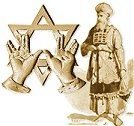
[ The following is related to this week's Torah reading, parashat Naso ("lift up!")... ]
06.17.16 (Sivan 11, 5776) The LORD spoke to Moses, saying, "Speak to Aaron and his sons, saying, 'Thus you shall bless the people of Israel, saying: "May Adonai bless you and keep you from illusions; may Adonai shine divine light upon you; may Adonai reveal his faces to you.' So shall they set my Name upon the people of Israel, and I will bless them" (Num. 6:22-27). The question is asked why the priests were needed to confer God's blessing, and what is meant by the idea of God "setting his Name" upon the people. The sages reply that the blessing is bestowed by a mediator to show that all things flow from the Holy One, and there is no one who can rightly say, "by my strength and my power alone has this come to pass" (Deut. 8:17). Therefore the blessing is graciously given to those who simply open their hearts to receive it: "May Adonai bless you; may Adonai shine divine light upon you; may Adonai reveal his faces to you..." Everything that comes to us comes in God's Name, as it is written: "Every good gift and every perfect gift is from above, coming down from the Father of Lights (אֲבִי הָאוֹרוֹת) with whom there is no variation or shadow due to change" (James 1:17). The blessing of God (בִּרְכַּת יָהּ) is to "bear His Name" by being filled with the strength of His Presence, walking in the flow of His power, completely in union with His will...
For more on this subject, see "The Hebrew Priestly Blessing."
 |
Draw near in your need...

06.17.16 (Sivan 11, 5776) "Draw near to God, and he will draw near to you" (James 4:8). There are no conditions given here -- other than your raw need to connect with God for help. "Purify your hearts, you double-minded ones" (δίψυχοι, lit. "two-souled ones"); make up your mind and be unified within your heart: "How long will you go limping between two different opinions?" (1 Kings 18:21). You are invited to come; God has made the way; your place at the table has been set and prepared. "Let us draw near with a sincere heart in full assurance of faith (ἐν πληροφορίᾳ πίστεως), with our hearts sprinkled clean from an evil conscience and our bodies washed with pure water. Let us hold fast the confession of our hope without wavering, for he who promised is faithful" (Heb. 10-22-23).
Receiving what you give...
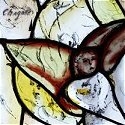
[ The following is related to this week's Torah reading, parashat Naso ("lift up!")... ]
06.17.16 (Sivan 11, 5776) From our Torah portion this week we read: "Each one shall keep his holy donations (אִישׁ אֶת־קֳדָשָׁיו לוֹ יִהְיוּ): whatever anyone gives to the priest shall be his" (Num. 5:10). This is the spiritual principle that what we give away is what we possess, and as we measure, so will be measured back to us again (Luke 6:38). The sages comment that being selfish, acquisitive, and power-hungry are drives common among the animals, but what makes a man unique is his ability to sacrifice himself for others. Giving tzedakah, then, is an inherently spiritual act, and ultimately only that which we give to others in love will be kept as holy. "For where your treasure is, there your heart will be also" (Matt. 6:21).
מַלְוֵה יְהוָה חוֹנֵן דָּל
וּגְמֻלוֹ יְשַׁלֶּם־לוֹ
mal·veh · Adonai · cho·nein · dal
u·ge·mu·lo · ye·sha·lem · lo

"Whoever is generous to the poor lends to the LORD,
and He will repay him for his kindness."
(Prov. 19:17)

Hebrew Study Card
The Prophet like Moses...

[ The following is related to this week's Torah reading, parashat Naso ("lift up!")... ]
06.17.16 (Sivan 11, 5776) Our Torah portion this week (i.e., parashat Naso) concludes, "And when Moses went into the tent of meeting to speak with the LORD, he heard the Voice speaking to him from above the mercy seat (i.e., kapporet: כַּפּרֶת) that was on the ark of the testimony, from between the two cherubim; and it spoke to him" (Num. 7:89).
Now Moses was truly an extraordinary and wonderful person -- Israel's first great prophet, priest, and king. His life can be divided into three great distinct periods of 40 years each. First, he was raised as an Egyptian and lived as a prince of Egypt (the Egyptian period); second, he fled to the land of Midian where he became a shepherd and encountered God in the desert (the Midianite period); and third, after the great deliverance from Egypt, Moses led the people back to Sinai where he 1) became the mediator (priest) of the covenant between God and Israel, 2) legislated the various laws of the Torah, and 3) received the prophetic vision of the Tabernacle, the future exile, and the ultimate glory of Zion.
Notice, however, that Moses was extraordinary in the sense that he transcended the entire system of religion that was later established as Judaism. First, as the great legislator, Moses declared the terms of the law, serving as its voice of authority. Second, as the high priest of Israel, Moses instituted various sacrificial rites before the laws of sacrifice were enacted. For example, he instituted the Passover sacrifice in Egypt (Exod. 12:1-11), and when the people later reached Sinai, he offered blood sacrifices to ratify the terms of the covenant (Exod. 24:8). Moreover, he ascended the mountain and received the prophetic vision of the Mishkan (Tabernacle) before the priesthood had been instituted in Israel (Exod. 25:8-9). And even after the laws of the priests were enacted and the Tabernacle was set up, Moses went before the very Holy of Holies to hear the Voice of the LORD, even though technically speaking this was forbidden, since he was not a kohen (i.e., descendant of Aaron).
"A prophet like unto me..." (Deut. 18:15). I mention all this because some people stumble over the fact that Yeshua, who was from the tribe of Judah, served as Israel's High Priest of the New Covenant. Of course this issue is addressed in the Book of Hebrews, where the role of the Malki-Tzedek priesthood is ascribed to King Yeshua (Heb. 5:6-11; 7:1-19), but it is important to realize that Moses himself foresaw the coming of the Messiah as Israel's great prophet, priest and King (Deut. 18:15-19; John 5:36). Indeed, just as Moses himself was "outside" the law by serving as Israel's priest but nevertheless was commissioned by God Himself, so also with Yeshua, who instituted the sacrifice of His blood as the Lamb of God and who went directly before God's Throne to intercede on our behalf.
For more on this subject, see "Moses' Prophecy of the Messiah."
 |
The Sword of the Spirit...

06.17.16 (Sivan 11, 5776) We are told not to fear men, who are only able to kill the body, but not the soul (Matt. 10:28). However, there is still the grave danger that the soul itself can be destroyed by means of its own apathy. In the physical realm, we can be killed by the hand of another, but in a spiritual sense, we can only be killed if we willingly destroy ourselves. Therefore my prayer is often, "LORD, save us from ourselves - from our own despair, from our own self-destructive urges. Help us to love you and turn away from all doubt; help us to affirm your promise of life given to us every day. Amen."
"We have met the enemy, and he is us," but if that is so, how are we able to overcome the deceptiveness of our own hearts? How do we defeat our own inner evil, the yetzer hara, our own subconscious "death wish"? How can we transcend the lusts of the flesh and our own natural, all-too-human desires? Yeshua gives us the answer: "Sanctify them in the truth; your word is truth" (John 17:17). We are able to overcome our natural tendency to deceive ourselves by staying grounded in the Word of truth, kitvei Hakodesh, the Holy Scriptures (2 Tim. 2:15). "For whatever was written in former days was written for our instruction, that through endurance and through the encouragement of the Scriptures we might have hope" (Rom. 15:4). God's promises give us life (Psalm 119:50). It is the Scriptures that "are able to make you wise for salvation through faith in Yeshua the Messiah" (2 Tim. 3:15). Of course, the Scriptures themselves are the means to the end of encountering God Himself and partaking of the power of the Holy Spirit, but they are foundational to all experience, and all spiritual experience must be grounded in their truth (Isa. 8:20).
In Paul's description of the "armor of God," the Scriptures are called the "sword of the Spirit" (τὴν μάχαιραν τοῦ πνεύματος) which is the Word of God (Eph. 6:10-18). "For the Word of God is living and active, sharper than any two-edged sword, piercing to the division of soul and of spirit, of joints and of marrow, and discerning the thoughts and intentions of the heart" (Heb. 4:12). Studying God's truth is the divinely appointed means of obtaining discernment and perseverance for the spiritual warfare of this world. Note the connection between the Word and the Spirit in these verses... The way of the righteous, derekh tzaddikim (דֶּרֶךְ צַדִּיקִים), is marked by fruit of the Spirit. Therefore the beloved Book of Psalms begins, "Blessed is the man who walks not in the counsel of the wicked, nor stands in the way of sinners, nor sits in the seat of scoffers; but his desire is the Torah of the LORD, and in His Torah he meditates day and night" (Psalm 1:1-2).
אַשְׁרֵי־הָאִישׁ אֲשֶׁר לא הָלַךְ בַּעֲצַת רְשָׁעִים
וּבְדֶרֶךְ חַטָּאִים לא עָמָד
וּבְמוֹשַׁב לֵצִים לא יָשָׁב
כִּי אִם בְּתוֹרַת יְהוָה חֶפְצוֹ
וּבְתוֹרָתוֹ יֶהְגֶּה יוֹמָם וָלָיְלָה
ash·rei · ha-ish · a·sher · lo · ha·lakh · ba·a·tzat · re·sha·im
uv·de·rekh · cha·ta·im · lo · a·mad
uv·mo·shav · lei·tzim · lo · ya·shav
ki · im · be·to·rat · Adonai · chef·tzo
uv·to·ra·to · ye·he·geh · yo·mam · va·lai·lah

"Happy is the man who walks not in the counsel of the wicked,
nor stands in the way of sinners,
nor sits in the seat of scoffers;
but his delight is the Torah of the LORD,
and in His Torah he meditates day and night"
(Psalm 1:1-2)
Brief Audio Commentary

Hebrew Study Card
This man is "blessed" because the one who desires the truth of the LORD has found great treasure, and all that he puts his hand to do shall prosper (Psalm 1:3). Notice that the word "desire" (i.e., chafetz: חָפֵץ) expresses the innermost wish of the heart or soul (Matt. 15:19; Luke 6:45). Strong desire – passion – is vital to the apprehension of the truth, and it is a great gift from God to be free from the slavery of habit and unreflective, visceral bondage to worldly lusts. As David said, "my soul is consumed with longing for Your decrees at all times" (Psalm 119:20). Hunger for God, strong desire for Him, is a sign that He is indeed calling you to walk in His ways, since you would never truly seek Him unless He first called out to you (John 6:44). The word "Torah" here refers to God's wisdom, His will, His way – not exclusively to the laws (mishpatim, chukkim, etc.) written in the Bible.
Where it is written, "you shall meditate upon it day and night" (Josh 1:8), R' Yochanan said: this is no command or obligation, but a blessing, since the words of Torah - like the Tree of Life that brings forth its fruit in its season (Psalm 1:2-3) - brings prosperity and hatzlachah -- good success -- to those who delight in it.
The person who "reflects" or meditates on God's way will let the truth inform and empower his decisions in this world. The word yehegeh (יֶהְגֶּה) means that the righteous person is so filled with the truth of the Scriptures that words leave his mouth as if on their own. This person will behold and take hold of the Tree of Life (Psalm 1:3). If you find studying and living the truth of Scripture joyless, be careful that you don't drift into spiritual exile! Beware of apathy and be vigilant of the great danger of destroying yourself... God says that those who delight in the study of His word please Him, but others He allows to perish.
The one who genuinely desires God's truth and meditates upon it "day and night" will be saved from the judgment that will befall the ungodly (Psalm 1:5-6). Studying and living God's truth is therefore the means of your preservation and perseverance in this world. Living the truth of Scripture produces assurance that God knows you and will take you through the corridor of this world unharmed by the coming judgment (John13:17).
"Many are my heart's distresses; let me know Your Ways, Eternal One; teach me Your paths" (Psalm 25:4,17). "Upon you I have leaned from before my birth; you are He who took me from my mother's womb. My praise is continually of you. You have made me see much trouble and hardship, but You will revive me again and raise me up from the depths of the earth" (Psalm 71:6,20). Baruch atah HaShem, ha-noten la'ya'eif ko'ach - "Praised are You, LORD, who gives strength to the bowed down."
For more on this subject, please see article, "The Way of the Righteous."
 |
Death and Resurrection...

06.16.16 (Sivan 10, 5776) A central task of philosophy – spiritually understood – is to teach us how to face death, and how to find courage despite our losses... The secret dread of the soul is the passing away of our relationships with others, the fear of being separated from all we hold dear. It is self evident, however, that life in this physical world leads to its own demise, and that things eventually perish. The irrepressible passage of time, the decay and "flux" that inheres in all things of this realm, and the consciousness that our existence here is brief, all yield suffering of the heart. But because suffering is bound up with mortality and the sickness of "spiritual death," we can find peace only in a power greater than death, in a power that cannot be touched by death, and that power is found in the resurrected Reality of Yeshua, the Ascended One (אֵל עֶלְיוֹן) who triumphed over death, and the One who alone is the "key holder" of hell and death (Rev. 1:8). Unlike various pagan philosophies that sought to find consolation from suffering by thinking that the soul would be reabsorbed (or reincarnated) back into the cosmos (e.g., Stoicism, Epicureanism, Gnosticism), and unlike those religious traditions that attempt to extinguish the concept of the self by means of attaining "nirvana" (e.g., Buddhism), or that attempt to lose consciousness in the "oneness" of impersonal ultimate reality (e.g., Hinduism, monism, pantheism), faith in the resurrected reality of Yeshua confesses individual life in the world to come, with the continued real identity, consciousness, and eternal perpetuation of the person. Unlike reincarnation philosophy that regards a human life as a "karmic episode" in an repeated journey through the ongoing cycle of birth-death-rebirth (i.e., Samsara), faith in Yeshua affirms the uniqueness of every moment, life's redemptive purpose and eternal significance. Blessed is the LORD God Almighty: the incarnation, death, and resurrection of Yeshua invests each person with sacred significance that reaches beyond this world unto the world to come...
לִמְנוֹת יָמֵינוּ כֵּן הוֹדַע
וְנָבִא לְבַב חָכְמָה
lim·not · ya·me·nu · ken · ho·da
ve·na·vi · le·vav · chokh·mah

"Teach us to number our days
that we may get a heart of wisdom."
(Psalm 90:12)

Hebrew Study Card
Moses prayed to God: "teach us to number our days," that is, help us understand how to make our days count for eternity, to have a weight of glory that will shine in the world to come... The sages say on the day of death, one considers one's life as if it had been a single day... Life goes by so quickly, and we never know when our personal Rosh Hashanah will come. "No one knows the day or hour..." That's why it is so vital to be healed and to turn to God while there is still time. So turn to him today and bacharta ba'chayim – "choose life!" "For this commandment (of turning to God in teshuvah) is not hidden from you, and it is not far away. It is not in heaven... nor across the sea.... Rather, the matter is very near you - in your mouth and your heart - to do it" (Deut. 30:11-14; cp. Rom. 10:8-13).
The Good Fight of Faith...

06.16.16 (Sivan 10, 5776) Our Torah teaches us the famous statement: tzedek, tzedek tirdorf (צֶדֶק צֶדֶק תִּרְדּף): "Righteousness, righteousness, you shall pursue" (Deut. 16:20). The sages infer that the double mention of the word "righteousness" implies that the pursuit of righteousness must itself be righteous. It makes no sense to repay evil with evil for the sake of the good, after all. And that applies to how we regard our own inner struggle with anger, lust, fear, and so on. "Whoever battles with monsters had better see to it that it does not turn him into a monster" (Nietzsche). A God-fearing man once complained to a sage that he was tormented by evil desire and had become despondent over it. The sage listened intently and then said, "Guard yourself from such despondency above all else, for it is worse than sin. When the yetzer [evil impulse] awakens desire in us, it is not concerned with plunging us into sin, but with plunging us into despair by way of our sinning." May God help us battle against evil solely in the light of His glorious Presence and in the power of God's might.
Note: Our world thrives on "outrage" and a victimization mentality... Blaming others for your struggle is an evil approach that will never receive heaven's blessing... "Blessed is the man who makes the LORD his trust, and who does not turn to the proud or turn aside to lies" (Psalm 40:4); "no one who practices deceit shall dwell in my house; no one who utters lies shall continue before my eyes" (Psalm 101:7; Rev. 21:27). The walk of faith is one of honesty, humility, and learning to be responsible for your choices. "The humble man will attain a place of soul rest. As he walks on in humility he will be happy to let God defend him. The old struggle to defend himself is over. He has found the peace which humility brings" (A.W. Tozer). May it please the LORD to give us all hearts of genuine humility.
Now "may the LORD our God, according to the riches of His glory, grant you to be strengthened with power through His Spirit in your inner being, so that Messiah dwells in your heart through faith, and that you, being rooted and grounded in love, may have strength to comprehend with all the kedoshim what is the breadth and length and height and depth of the love of Messiah, that surpasses knowledge, and that you may be filled with all the fullness of God" (Eph. 3:16-19).
 |
Teshuvah and Healing...
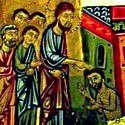
06.15.16 (Sivan 9, 5776) Repentance is an ongoing disposition of life in Messiah, since it rightly relates us to God. First we encounter our incurable sickness - the inner contradiction and bondage of soul that both loves and hates sin - and then we seek God's saving power in Yeshua. As the Apostle Paul said: "Who can save me from the misery of myself? – God alone, through Jesus (Rom. 7:18-25). This is the first step, to know the "miserable creature that I am," that is, the slavery of your will to sin, and the second is to be willing to give this sickness of your soul to God's care in Yeshua. As he said, "Those who are well have no need of a doctor, but those who are sick. I have not come to call the 'righteous,' but sinners to repentance" (Luke 5:31-32). Yeshua regarded forgiveness of your sins as essential to finding inner healing, even more important than health, prosperity, or religious observance.
"It is God's nature to make something out of nothing; hence the one who is not yet nothing, out of him God cannot make anything... and therefore God accepts only the forsaken, cures only the sick, gives sight only to the blind, restores life only to the dead, sanctifies only sinners, gives wisdom only to the unwise. In short, He has mercy only on those who are wretched" (Luther's Works, Volume 14: Selected Psalms III)
From the perspective of the natural life, we "descend in order to ascend," we must die to find life... From the perspective of the spiritual life, however, repentance means finding healing by returning to the truth of love and recovering your heart's desire in God. As Yeshua said, "Repent, for you have lost your first love..." (Rev. 2:4-5). Turn around: Look at what is missing within! He appeals to you like a lover standing outside in the cold, calling out your name, and knocking for you to open the door to let him inside (Rev. 3:19-20). Open the door of your heart! Return to him now! "Lord, help me turn to receive your love..."
Return to Sanity...
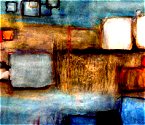
06.15.16 (Sivan 9, 5776) Repentance is a return to sanity which begins with the resolution to question your presuppositions and to change your thinking... There are three requisites for genuine repentance, that is, for turning to God in the truth, namely: 1) seeing eyes; 2) hearing ears; and 3) an understanding heart, ready to be healed (Isa. 6:10). God alone does the miracle but it is nevertheless your responsibility to believe that the miracle is for you. Repentance is the first step of salvation, as Messiah said: "Repent and believe in the good news" (Mark 1:15), and apart from repentance man has no real existence. As Yeshua said, "Truly, truly, I say to you, unless one is born again he cannot see the kingdom of God" (John 3:3). Repentance is the expression of trust in God's love, and by means of it we affirm: "I am ready to exist as a person of worth." Come alive, friends!
God's Relentless Love...

06.15.16 (Sivan 9, 5776) When King David wrote "surely goodness and mercy (טוֹב וָחֶסֶד) shall follow me all the days of my life" (Psalm 23:6), the Hebrew verb translated "shall follow me" (i.e., יִרְדְּפוּנִי) comes from a root (i.e., radaf: רָדַף) that means to "to pursue" or to "chase down," as a hunter tracks his prey. King David was sure that God's lovingkindness would "hound" him as he made his way through this world - even in the dark places, even in "the valley of the shadow of death" (בְּגֵיא צַלְמָוֶת) - for even there God's Presence would comfort him and direct his steps (Psalm 139:8-10). Praise God we have a Good Shepherd who meets all our needs and who pursues us as we walk our way through this world. Therefore, "May your love, O LORD, be upon us, as we hope in You."
יְהִי־חַסְדְּךָ יְהוָה עָלֵינוּ
כַּאֲשֶׁר יִחַלְנוּ לָךְ
ye·hi · chas·de·kha · Adonai · a·lei·nu
ka·a·sher · yi·chal·nu · lakh

"May your love, O LORD, be upon us,
as we hope in You"
(Psalm 33:22)

Hebrew Study Card
We are given significant choices in this life. Whatever the heart seeks, it will find. We are constantly "asking, seeking, and knocking" (Matt. 7:7), even if we are often unaware of our heart's search. The one who pursues righteousness will find it, just as evil will come to the one who searches after it (Prov. 11:27). As it is written, "Those who worship worthless idols forsake the love (i.e., chesed: חֶסֶד) that could be theirs" (Jonah 2:8). David understood that as he pursued God, God's love would pursue him; as we seek, so we are sought by God; as we draw near to God, so He will draw near to us (James 4:8).
The prophet Hosea likewise cried out: "Let us know; let us press on to know (i.e., נִרְדְּפָה, "pursue after") the LORD; His going out is sure as the dawn; He will come to us as the showers, as the spring rains that water the earth" (Hos. 6:3). May God help us pursue him be'khol levavkha - with all our heart - because He has promised, "You will seek me and find me, when you seek me with all your heart" (Jer. 29:13). And may the love of the LORD indeed be upon us, even as we put our hope in Him. Amen.
 |
Insanity and Sin...

[ The following is related to this week's Torah reading, parashat Naso ("lift up!")... ]
06.14.16 (Sivan 8, 5776) From our Torah reading this week (i.e., parashat Naso) we read, "If any... goes astray and breaks faith..." (Num. 5:12). The Talmud comments that "goes astray" (i.e., tisteh: תִשְׂטֶה) is written so it may be read "goes insane" (i.e., tishteh: תִשְׁטֶה), and concludes that sin is a form of insanity, that is, a denial of what is real, and therefore a state of delusion. We are required, of course, to believe that God is knowable (Rom. 1:19-20), that we are always in His presence (Prov. 15:3; Psalm 94:9; 139), that He knows all things (Psalm 147:5), and nothing can be hidden from Him (Isa. 40:28; Jer. 23:24; Heb. 4:13), but when we sin, we "break from" this reality and deny the divine Presence by a perverse act of self-exaltation. Whenever we imagine that we are unseen by God or whenever we "forget" that we live, move, and have our being in His presence, we are denying reality. Our sin causes us lose sight of what's real: we forget who God is; we forget who we are; and we exile ourselves from the Source of life... Surely sin is a form of insanity, and therefore we have a moral and spiritual obligation to think clearly and to value truth.
 |
Bearers of His Peace...

[ The following is related to this week's Torah reading, parashat Naso ("lift up!")... ]
06.14.16 (Sivan 8, 5776) Our Torah reading for this week gives us the ancient priestly blessing, the great expression of hope and grace that transforms us into "name bearers" of God. The blessing of the LORD guards us from illusion, directing our hearts to focus on what matters most. God's radiance changes us, revealing the miracle of grace. As God "lifts up his face," he discloses his Presence within all things, and imparts to us his healing peace. God's Name is "put upon" us so that we become vessels that carry redemptive love and healing to the world. We are endowed with divine energy to be made fruitful; we are empowered to serve God in the truth. The consciousness of our blessedness touches every moment, and we begin to see all of life as sanctified, sacred, full of wonder and meaning.
יְבָרֶכְךָ יְהוָה וְיִשְׁמְרֶךָ
יָאֵר יְהוָה פָּנָיו אֵלֶיךָ וִיחֻנֶּךָּ
יִשָּׂא יְהוָה פָּנָיו אֵלֶיךָ וְיָשֵׂם לְךָ שָׁלוֹם
ye·va·re·khe·kha Adonai ve·yish·me·re·kha;
ya·eir Adonai pa·nav e·ley·kha vi·chun·ne·ka;
yis·sa Adonai panav e·ley·kha ve·ya·sem le·kha sha·lom

"The LORD bless you and guard you;
The LORD make his face to shine upon you and be gracious to you;
The LORD lift up his countenance upon you and give you peace."
(Num. 6:24-26)

Download Study Card
Addendum: Unlike some "religions" (i.e., ideologies, philosophies of mere men) that fool themselves into believing they are doing heaven a favor by killing others in the name of their god, let it be known that the LORD God of Israel is the God of Peace (אֱלהֵי הַשָּׁלוֹם), the God of Love (אֱלהֵי הָאַהֲבָה), the God of Truth (אֱלהֵי אֱמֶת) -- the Suffering One who Carries us in our weaknesses and heals us of our loss of the Blessing of Reality.... Those hate-filled religions that dare to judge others - and even justify killing them in the name of their god - will share the destiny reserved for all those who love the violence of the lie. As Martin Buber once said, "What is accomplished through lies can assume the mask of truth; what is accomplished through violence can go in the guise of justice, and for a while the hoax may be successful. But soon people realize that lies are lies at bottom, that violence is violence - and that both lies and violence will suffer the destiny history has in store for all that is false." "Those who take up the sword shall perish by the sword" (Matt. 26:52).
On the other hand, those "religions" (i.e., ideologies, philosophies of mere men) that seek to excuse evil, to make "tolerance" their god, to be so "open-minded" that they are without any real conviction, are essentially co-conspirators in the violence of the lie... Christian denominations that follow "secular culture" by denying the truth of Scripture, that deny the Reality and Presence of the Messiah, and that downplay the importance of trusting Yeshua alone for eternal life, are in practical collusion with the world and its violence...
The Spirit states that in acharit ha'yamim (אַחֲרִית הַיָּמִים), the latter days, people will have "seared consciences," that is, a moral sense that is rendered unresponsive, numb, and unfeeling... People will be unable to discern the significance of moral and spiritual reality, thereby silencing any qualm of moral protest. We see this today in our scandal-saturated culture, as politicians brazenly lie with impunity and moral anarchy is openly celebrated. We must be careful not to heed the devil's logic of compromise, that "dialectic" that denies transcendental moral reality by pretending that truth can only be defined by the exigencies of the hour and its desire. "The world passes away and the lusts thereof..." (1 John 2:17). We must consciously remind ourselves that the LORD God of Israel does not endorse sin, regardless of any supposed political benefit given to the world at large, and that the end never justifies the means. God is not a pragmatist, and there are no "noble lies" for sake of the Kingdom of Heaven...
 |
Everyday Revelation...
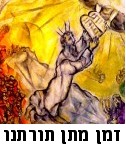
[ The following is related to the holiday of Shavuot (i.e., "Pentecost")... ]
06.13.16 (Sivan 7, 5776) The Kotzker rebbe asked, "Why is Shavuot ("Pentecost") called 'zman mattan torateinu,' the time of the giving of our Torah, rather than 'zman kabbalat torateinu,' the time of the receiving of our Torah? The reason is that on that momentous day at Sinai, only the giving of the Torah occurred, whereas the receiving of the Torah must take place each and every day, as it says, "Trust in the LORD 'bekhol libbekha' (בְּכָל־לִבֶּךָ) - with all your heart; and know Him 'bekol derakhekha' (בְּכָל־דְּרָכֶיךָ), in all your ways" (Prov. 3:5-6). The giving of the Torah is described as a "loud and never-ending voice" (Deut. 5:19), though it is our constant responsibility to shema – to receive the invitation of God's heart.
בְּטַח אֶל־יְהוָה בְּכָל־לִבֶּךָ
וְאֶל־בִּינָתְךָ אַל־תִּשָּׁעֵן
בְּכָל־דְּרָכֶיךָ דָעֵהוּ וְהוּא יְיַשֵּׁר ארְחתֶיךָ
be·tach · el · Adonai · be·khol · lib·be·kha
ve'el · bi·na·te·kha · al · tish·a·en
be·khol · de·ra·khe·kha · da·ei·hu · ve·hu · ye·ya·sher · or·cho·te·kha

"Trust in the LORD with all your heart,
and do not lean on your own understanding.
Know Him in all your ways, and He will straighten your paths."
(Prov. 3:5-6)

Hebrew Study Card
"Trust in the LORD with all your heart... know Him in all your ways" (Prov. 3:5-6). The Hebrew word for trust is "bittachon" (בִּטָחוֹן), from a root word (בָּטָח) that means "to lean upon," to feel safe and secure.... Bittachon describes emotional acceptance of the goodness of the LORD. Some of the sages have said that while emunah (אֱמוּנָה), or "faith," represents a state of cognitive understanding (בִּינָה) that God is involved in all the events of the universe, bittachon means emotionally trusting that the Lord is present in every situation for your good.... Rabbi Bechaya put the distinction this way: "Everyone with bittachon has emunah, but not everyone with emunah has bittachon." Bittachon is an intuitive awareness of the personal love of God for your life, coupled with complete trust that He deeply cares for you (Rom. 8:28). It is an expectation that the love of God is "I-AM-always-with-you," too.
"Know Him In all your ways," and that means whatever way you find yourself in, which of course includes the way of your struggles, your transgressions, and your heartaches, as well as the way of your deepest longing and hope...
 |
Parashat Naso - נשא

06.13.16 (Sivan 7, 5776) Our Torah portion for this week (i.e., parashat Naso) includes the famous blessing that Aaron and his sons (i.e., the priests) were instructed to recite over the people of Israel. The Hebrew text of the blessing (Num. 6:24-26) begins with three words, is comprised of three parts, invokes the divine Name three times, and is therefore appropriately called "the three-in-one blessing." Notice that the words are spoken in the grammatical singular rather than plural because they are meant to have personal application, not to be a general benediction over a crowd of people. The phrase, "The LORD lift up His face toward you..." (יִשָּׂא יְהוָה פָּנָיו אֵלֶיךָ) pictures the beaming face of a parent as he lifts up his beloved child in joy... The repetitive construction of God "lifting up His face" (יְהוָה פָּנָיו אֵלֶיך) suggests that God's compassion now flows outward to the child in superabundant grace. Undoubtedly Yeshua recited this very blessing over his disciples when he ascended back to heaven, though of course He would have spoken it in the grammatical first person: "I will bless you and keep you (אני אברך אותך ואשמור לך); I will shine upon you and will be gracious to you; I will lift up my countenance upon you, and give you my shalom" (Luke 24:50-51).
יְבָרֶכְךָ יְהוָה וְיִשְׁמְרֶךָ
יָאֵר יְהוָה פָּנָיו אֵלֶיךָ וִיחֻנֶּךָּ
יִשָּׂא יְהוָה פָּנָיו אֵלֶיךָ וְיָשֵׂם לְךָ שָׁלוֹם
ye·va·re·khe·kha · Adonai · ve·yish·me·re·kha
ya·eir · Adonai · pa·nav · e·ley·kha · vi·chun·ne·ka
yis·sa · Adonai · pa·nav · e·ley·kha · ve·ya·sem · le·kha · sha·lom

"The LORD bless you and guard you;
The LORD make his face to shine upon you and be gracious to you;
The LORD lift up his countenance upon you and give you peace."
(Num. 6:24-26)
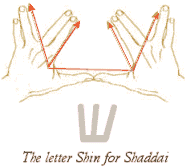
Download Study Card
Note: To learn more about this wonderful blessing, click here (you can also listen to it chanted by clicking here).
The Chesed of Ruth...
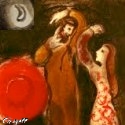
[ The Book of Ruth is traditionally read during the holiday of Shavuot ("Pentecost")... ]
06.12.16 (Sivan 6, 5776) The Book of Ruth (מְגִלַּת רוּת) tells a marvelous story of redemptive love and devotion (i.e., chesed: חֶסֶד) dating back to the dark period of Jewish history known as the "time of the Judges" (c. 12th century BC). The story is traditionally read during Shavuot, both because the events recounted took place during the time of the spring harvest (linking it to the agricultural aspect of holiday), and Ruth herself is a picture of willing acceptance of a Jewish lifestyle (linking it to the religious aspect of the holiday). Just as Israel willingly accepted the Torah at Sinai without knowing its content (kol asher diber Adonai na'aseh ve'nishmah), so Ruth gave up everything she knew to accept the Torah. Like the people of Israel, Ruth believed in order to understand, not the other way around...
Ultimately the story of Ruth illustrates that the law by itself is unable to redeem us (as illustrated by the unnamed 'redeemer' who did not wish to "mar" his inheritance), and therefore something more is needed. A true go'el (גאֵל), or "kinsman redeemer," is marked by love and compassion, just as the law of the Spirit of life (תּוֹרַת רוּחַ הַחַיִּים) is what sets us free from the law of sin and death (תּוֹרַת הַחֵטְא וְהַמָּוֶת). Ruth overcame the "letter of the law" by faith in God's redemptive love, just as Yeshua overcame the judgment of the law by means of God's greater love... Therefore like Ruth, we have to "go to the threshing floor" as a forbidden outsider to lay claim to the redeeming love of God; we have to say to the LORD, "Spread your wings over your servant, for you are my Redeemer" (Ruth 3:9). Indeed, by faith we have to push past the enmity required by the Torah with its commandments and ordinances to receive our healing - and to find our place within the family of God...
כִּי אֶל־אֲשֶׁר תֵּלְכִי אֵלֵךְ
וּבַאֲשֶׁר תָּלִינִי אָלִין
עַמֵּךְ עַמִּי וֵאלהַיִךְ אֱלהָי
ki · el · a·sher · tel·khi · e·lekh
u·va·a·sher · ta·li·ni · a·lin
a·mekh · am·mi · ve·lo·ha·yikh · E·lo·hai

"For where you go I will go
and where you lodge, I will lodge
your people shall be my people, and your God my God."
(Ruth 1:16)
In this connection it is interesting to see that King David's genealogy not only included the noble line of Abraham/Sarah, Isaac/Rebakah and Jacob/Leah, but it also included Judah/Tamar, Boaz/Ruth, and Salmon/Rahab. Moreover, in the genealogy of Yeshua the Messiah given in Matthew (1:1-16), only four women (besides Mary) are explicitly named: Tamar (who seduced her father-in-law), Rahab (a prostitute), Ruth (a Moabitess), and "the wife of Uriah" (i.e., Bathsheba, an adulteress). Each of these women of faith illustrate that God's love and grace overcomes His judgment. Here is a (very simplified) diagram I made to indicate some of the relationships:
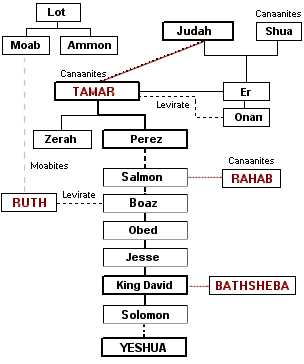 |
Because of her great faith, Ruth's teshuvah was accepted, even though she was defined by the law to be an outcast - a Moabite of whom the law stated: "none of them may enter the assembly of the LORD forever" (Deut. 23:3). Ruth's tenacious faith was not unlike that of the Canaanite woman who was accepted by Yeshua (see Matt. 15:22-28). Both courageous women overcome the verdict of the law by trusting in God's greater love and grace... In the case of Ruth, her faith enabled the House of David to come - and from this, the line of Yeshua our Messiah and Savior Himself!
The story of how Ruth boldly came in brokenness and need recalls the account of how Moses broke the tablets of the law just 40 days after the very first "Shavuot" experience at Sinai. It was later, when Moses was in a state of disarray and despair - and when Israel was in exile - that he came boldly and pled for deliverance from the verdict of the law itself... God then revealed the meaning of His Name YHVH, forgave the people, and opened up the new covenant promise to Israel - something the law by itself could not provide (Exod. 34:6-7).
Note: For more on this subject, see "The Chesed of Ruth."
 |
Moving Heaven and Earth...

06.10.16 (Sivan 4, 5776) Act as if your choices have eternal significance; they do; pray as if your life depends on it; it does. Praying in accordance with the will of God - to know Him, to walk in the light of his love and to be filled with wisdom, patience, kindness, and so on, will assuredly move heaven and earth (1 John 5:14). God is faithful and always hears those who call out to him with sincerity of heart: "The LORD is near to all who call on him, to all who call on him in truth" (Psalm 145:18). Rouse then your heart! Boldly draw near to the throne of Grace to find help in your present hour of need (Heb. 4:16). Cry out to God Most High (לֵאלהִים עֶלְיוֹן), to the very One who will fulfill his purpose for you (Psalm 57:2).
אֶקְרָא לֵאלהִים עֶלְיוֹן לָאֵל גּמֵר עָלָי
יִשְׁלַח מִשָּׁמַיִם וְיוֹשִׁיעֵנִי חֵרֵף שׁאֲפִי סֶלָה
ek·ra · le·lo·him · el·yon · la'el · go·mer · a·lai
yish·lach · mi·sha·ma·yim · ve·yo·shi·ei·ni · che·ref · sho·a·fi · se·lah

"I cry to God Most High, to God who fulfills his purpose for me.
He will send from heaven and save me from the reproach of those who pursue me"
(Psalm 57:1-2)

Breath Prayers...

06.10.16 (Sivan 4, 5776) In times of severe testing people often do not need further teaching, but rather "endurance," or what the New Testament calls hupomone (ὑπομονή), a word that means "remaining [μένω] by [ὑπο]" the Divine Presence while being tested. Suffering people do not need moral platitudes from others, but only the will to believe, the resolution to stay constant, and to ability breathe out simple prayers for help to the LORD: "God have mercy..." "Help me, O God..." "I need Thee, O Lord..." When we receive grace to faithfully suffer, we hear the Spirit whispering back to us: "Be not afraid..." "Live in me..." "Walk in the light..." "I am with you always..." "You are loved..."
רְפָאֵנִי יְהוָה וְאֵרָפֵא
הוֹשִׁיעֵנִי וְאִוָּשֵׁעָה כִּי תְהִלָּתִי אָתָּה
re·fa·ei·ni · Adonai · ve·ei·ra·fei
ho·shi·ei·ni · ve·iv·va·shei·ah, · ki · te·hil·la·ti · at·tah

"Heal me, O LORD, and I shall be healed;
save me, and I shall be saved, for you are my praise."
(Jer. 17:14)

Download Study Card
Prayer for this hour...

06.10.16 (Sivan 4, 5776) Many of us are hurting, Lord, and we sometimes feel alone in our struggle... This world seems so senseless, so brutal, and so evil at times; we feel powerless, overwhelmed, and even sick inside... We look to You, O God, and for your mercy and your power. Help us to accept what we cannot change and to completely trust in Your great healing to come, despite the depravity of the world around us. Remind us that though we cannot change the world, we are given grace to sustain our trust in You, our glorious and merciful Healer. And may we never be ashamed; may we never grow bitter; may our sorrows lead us from strength to strength. And may this time of testing lead us to greater wisdom, to deeper compassion, and finally back to You. Amen.
"The path of the righteous is like the light of dawn, which shines brighter and brighter until full day." From the first glimmer of heaven-sent faith we detect the divine light, "the light of dawn," which continues to grow more and more until it becomes as radiant as the midday, an image of the full light of the World to Come. Praise God that more light is coming to you who are trusting in the LORD, even in your present darkness: "He who began a good work in you will bring it to completion at the day of Yeshua our Messiah" (Phil. 1:6).
וְארַח צַדִּיקִים כְּאוֹר נגַהּ
הוֹלֵךְ וָאוֹר עַד־נְכוֹן הַיּוֹם
ve'o·rach · tzad·di·kim · ke'or · no·gah
ho·lekh · va'or · ad · ne·khon · hai'yom

"The path of the righteous is like the light of dawn,
which shines brighter and brighter until full day."
(Prov. 4:18)

Hebrew Study Card
Hope Upon Hope...

06.10.16 (Sivan 4, 5776) An old Jewish prayer, uttered somewhat wistfully, begins, "O Lord, I know that You will help us; but will You help us before You will help us?" It's not always easy to wait for God, especially when we are in pain or anxiety, but we must never, ever, give up; we must never forget the promise and reality of our ultimate healing in Jesus. Faith expresses hope in the Reality, Substance, and Being (ὑπόστασις) of the Invisible and is made captive to undying hope (Heb. 11:1). Therefore the Spirit cries out: "Hope to the LORD; be strong and strengthen your heart; and (again) hope to the LORD."
קַוֵּה אֶל־יְהוָה חֲזַק וְיַאֲמֵץ לִבֶּךָ
וְקַוֵּה אֶל־יְהוָה
ka·veh · el · Adonai · cha·zak · ve'ya·metz · lib·be·kha,
ve-ka·veh · el · Adonai

"Hope to the LORD; be strong and let your heart be strengthened;
and (again) hope to the LORD"
(Psalm 27:14)

Download Study Card
In this verse, the imperative verb translated "wait" is the Hebrew word kaveh (קַוֵּה), which might better be rendered as "look for with anticipation!" or "hope!" (the same root appears in the Hebrew word for hope, i.e., tikvah: תִּקְוָה). Note further that the verb ve'yametz is a causal active stem (i.e., Hiphal) in the "jussive mood," which means it is imperative – "command your heart to be strengthened," or "let your heart be made strong!" Make the decision to be strong in the LORD, and the LORD will give you strength to bear your present suffering: "Look to the LORD (קַוֵּה אֶל־יְהוָה) and find hope." Amen. God will help us, and he will help us before he will help us!
Each of us is still upon the "Potter's wheel," though we keep faith that God is molding us and shaping us to reach our end... "Blessed are you, LORD our God, King of the Universe, who walks with the wounded" (שֶׁהוֹלֵךְ עִם הַפְצוּעִים). Amen. "Blessed art You, LORD our God, King of the universe, who makes us captives of hope."
 |
Heart of Goodness...
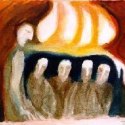
[ The great holiday of Shavuot ("Pentecost") begins sundown, Saturday June 11th... ]
06.09.16 (Sivan 3, 5776) It is traditional to read the "Chapters of the Fathers" (i.e., Pirkei Avot: פרקי אבות, a section of the Mishnah/Talmud) during the countdown from Passover to Shavuot. In Pirkei Avot 2:10, the sages debated what was the most important attribute to become a suitable bearer of God's message on earth. One sage answered, having a good eye (ayin tovah); another said being a good neighbor, and another said being wise in one's deeds. Rabbi Elazar, however, said having a "good heart" (לֵב טוֹב) was most important, which was agreed to be the best answer. Having a good heart is the foundation for spiritual life, but it is truly impossible to have such a heart apart from the miracle of the Holy Spirit. Note that the gematria of a "good heart," or lev tov (לֵב טוֹב), is 49, the number of days between Passover and the giving of the Holy Spirit at Shavuot (i.e., Pentecost). May God pour out His Spirit upon us so that we have the heart of Yeshua within us!
 |
The Book of God...

06.09.16 (Sivan 3, 5776) "You shall count for yourself seven weeks... (shivah shavuot tispar lakh) then you shall keep the "Feast of Weeks" (חַג שָׁבֻעוֹת) to the LORD your God, and you shall rejoice before the LORD your God" (Deut. 16:9-11). The 49 days between the great Exodus and the revelation at Sinai are called yamim shel sefirah (יָמִים שֶׁל סְפִירָה), the "days of counting." As soon as Israel departed from Egypt they began to count the days until they would encounter God, as Moses had earlier promised (Exod. 3:12), and their excitement climaxed when they arrived at Sinai on the third month after the Exodus (Exod. 19:1) -- just a few days before the anticipated 50th day ("Pentecost"). Note that the word "sefirah" ("counting") is composed of two separate words, "sefer" (סֵפֶר), meaning "book," and Yah (יָהּ), a name for God. During the 49 days we count down to the revelation of Torah, the Book of God, the Word of God, given to us on Shavuot.
 |
Note that Shavuot is also called Yom Habikkurim (יוֹם הַבִּכּוּרִים), the "day of first fruits" , a time when the first crops of the land were to be offered at the Temple (Num. 28:26; Deut. 8:8). God calls Israel "my son, my first born son" (Exod. 4:22), which alludes to the idea of first fruits, since the word bechor (בְּכוֹר), "first born" and bikkurim (בְּכּוּרִים), "first fruits" share the same Hebrew root. Israel was to represent the first fruits of a redeemed humanity. The bechor (first born) was blessed to help others draw near to God for salvation. Likewise Yeshua is called "the image of the invisible God, the firstborn of all creation," indicating his role as the leader of a redeemed and re-created humanity (Col. 1:15).
Recall that the climax of the 49 days countdown was not the giving of the lawcode at Sinai, but rather the revelation of the altar (i.e., the Tabernacle) and its subsequent fulfillment in the sacrificial death of Yeshua as our Lamb of God. Moreover, it was during this time that Yeshua made His post-resurrection appearances to His disciples - and indeed ascended to heaven during this 49 day period... Of particular importance is the holiday of Shavuot, day 7x7 of the count, when the Holy Spirit (Ruach ha-Kodesh) was given to the disciples in fulfillment of the promise of Yeshua that we would not be left comfortless... Shavuot, then, marks the time of "Jubilee" of the Spirit, when are clothed with power from on high to serve the LORD without fear. We are new creations in our Messiah!
 |
Through Wasted Places...

[ The following is related to our Torah reading for this week, parashat Bamidbar... ]
06.09.16 (Sivan 3, 5776) Between bondage and the promised land lies the desert - a transitional place where we learn to depend on God's sustenance alone to bring us through... The "desert experience" can help liberate the soul from its past slavery, or it can reveal that the soul really does not want to be free. Hardship and testing reveal to us what we really believe, after all. It's one thing to be set free from what has once enslaved you, but it is quite another thing to live as a free person, conscious of your own liberty and dignity as a beloved child of God. And yet we are warned that if we don't turn away from what has enslaved us in the first place, if we don't learn to truly see ourselves as a new creation (בְּרִיאָה חֲדָשָׁה), it is likely we will be led back to a place of slavery once again.
Be encouraged, friends. If you feel lost in the desert, remember that it was there that God revealed himself to broken Moses... As it is written, "Who among you fears the LORD and obeys the voice of his servant? Let him who walks in darkness and has no light trust in the name of the LORD and rely on his God" (Isa. 50:10). Yeshua is our Good Shepherd who promises to guide our way to the high country of Zion (Psalm 23; John 10:14-16).
 |
Remember who you are...

06.09.16 (Sivan 3, 5776) The haftarah for this coming Shabbat (i.e., Hosea 2:1-23) likens the Lord to a "jilted lover" who refuses to give up his passion for us. He loves us even in the filth of our depravity and redeems us from a life of shame; he zealously seeks us, takes us back, and restores us to a place of honor and joy... It is vital to understand that sin does not mean breaking God's law as much as it means breaking God's heart.
One of the greatest mistakes is to forget the message of who you really are and your beloved status before the LORD... "Fear not, for I have redeemed you; I have called you by name, you are mine" (Isa. 43:1). Forgetting who you are leads to forgetting who the LORD is, just as forgetting who the LORD is leads to forgetting who you are...
We must never forget who we really are, and how the very heart of God makes us real... A verse from the Torah speaks to us along these lines: "You are children of the LORD your God (בָּנִים אַתֶּם לַיהוָה אֱלהֵיכֶם). You shall not cut yourselves for the dead. For the LORD has chosen you to be for him a treasured people (עַם סְגֻלָּה) out of all the peoples who are on the face of the earth" (Deut. 14:1-2). God regards us as his beloved children, and therefore we must trust him as a child trusts his father. We may not always understand all that our father does, but we believe in his good will toward us, even in the face of death itself. We must not engage in self-destructive mourning (or self-destructive habits based on mourning), because we are treasured by God and we trust in God's promises for eternal life (John 11:25). Because of this, excessive mourning, interminable gloom, self-destructive anger, or the refusal to let go of our fear may indicate a lack of faith in God's care as our Father. Remember that where it says "God works all things together for good," that includes even physical death... Let us therefore "hope to the LORD (קַוֵּה אֶל־יְהוָה); be strong and strengthen our heart; and (again) let us hope to the LORD" (Psalm 27:14).
 |
The Nearness of God...

[ The following concerns the holiday of Shavuot, which begins Saturday, June 11th this year... ]
06.08.16 (Sivan 2, 5776) During the holiday of Shavuot ("Pentecost," or "Weeks") we recall how all the people heard the Voice of God (קוֹל אֱלהִים) speaking from the midst of the fire at Sinai (Deut. 4:33). This awesome event foreshadowed the great advent of the King and Lawgiver Himself, when the Eternal Word (דְבַר־יְהוָה) became flesh to dwell with us (Phil. 2:6-7; John 1:1,14), and it further foreshadowed the advent of the Spirit of Truth given to the disciples of Messiah (Acts 2:1-4). Any theology that regards God as entirely transcendent will have a problem with divine immanence, since the highness, holiness, and perfection of God will make him seem distant, outside of us, far away, and even unknown... Incarnational theology, on the other hand, manifests the nearness of God to disclose the divine empathy. Indeed, the LORD became Immanuel (עִמָּנוּ אֵל), "one with us," to share our mortal condition, to know our pain, and to experience what it means to be wounded by sin, to be abandoned, alienated, forsaken. The "Eternal made flesh" bridges the gap between the realm of Ein Sof (אין סוף), the Infinitely transcendent One, and the finite world of people lost within their sinful frailty. Of course we believe Adonai Echad (יְהוָה אֶחָד) - that the "LORD is One" - both in the sense of being exalted over all things but also in the sense of being compassionately involved in all things (Rom. 11:36). During Shavuot we celebrate the giving of the Torah both at Sinai and at Bethlehem, within our hearts. We celebrate that God is indeed the King and Ruler over all, but we further affirm that God's authority and rule extends to all possible worlds - including the realm of finitude, sickness, and even death itself.
 |
Shelter of Light...
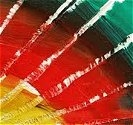
06.08.16 (Sivan 2, 5776) The sages say, "in the world to come (הַעוֹלָם הַבָּא), God will bring the sun out of its sheath to burn the wicked; they will be judged by it, but the righteous will be healed by it' (Shemot Rabbah). Yeshua is compared to the "Sun" because as the Sun is the central luminous body of our world, so Yeshua is called the "Light of Life" (אוֹר הַחַיִּים). Yeshua is melech ha-kavod (מֶלֶךְ הַכָּבוֹד), "the King of Glory" -- and no one can stand before the blinding power of His countenance (Psalm 27:4; Rev. 1:8-19). His is the "Fountain of Light" for all of creation, the Source and End of all life: "For by Him all things were created, in heaven and on earth, visible and invisible, whether thrones or dominions or rulers or authorities -- all things were created through Him and for Him. And he is before all things, and in him all things hold together... that in everything He might be preeminent" (Col. 1:16-18). Yeshua will come "with healing in his wings" -- that is, in healing radiance, with rays and beams, which metaphorically describe His influence over the hearts of men... Note that the word for "wings" used in this passage (i.e., kanaf: כָּנָף) pictures the image of a heavenly tallit (טַלִּית), or the heavenly firmament (רָקִיעַ) of the LORD's sheltering Presence.
Amen, there is a future time of healing and deliverance coming to us, though we must abide in the shadow of its substance for a bit longer: "For behold, the Day is coming (הַיּוֹם בָּא), burning like an oven, when all the arrogant and all evildoers will be stubble. The Day that is coming shall set them ablaze, says the LORD of hosts, so that it will leave them neither root nor branch. But for you who fear my Name, the Sun of Righteousness (שֶׁמֶשׁ צְדָקָה) shall rise with healing in its wings. You shall go out skipping like calves released from the stall. And you shall tread down the wicked, for they will be ashes under the soles of your feet, on the day when I act, says the LORD of hosts" (Mal. 4:1-3).
 |
Effective Spiritual Warfare...

06.08.16 (Sivan 2, 5776) There are two basic approaches to "spiritual warfare." The first is to discern the presence of evil and then pray for God's intervention, deliverance, protection, and so on. The second is to use ha'ayin ha'tovah (i.e., the good eye) and focus on the truth and Reality of God instead - to "set your thoughts on things above" (Phil. 4:8). Whereas the former approach may at times seem necessary to dissipate encroaching darkness to find inner peace, the latter approach has the decided advantage of trusting in the Divine Presence that pervades and overrules all things (Psalm 16:8). When David was surrounded by the enemy, he kept focused on the glory of the LORD. David knew that God would shelter him and elevate him above the powers of darkness (Psalm 27:1-6). The highest form of spiritual warfare, then, is to consciously turn away from fear by choosing to praise the LORD God, magnifying His Name, and walking before Him in awe...
 |
One day all that is hidden will become manifest, all secrets will be fully disclosed, and all will finally be healed (Matt. 12:36-37, Isa. 25:8; Rev. 21:4). "As I looked, thrones were placed, and the Ancient of Days took his seat; his clothing was white as snow, and the hair of his head like pure wool; His throne was ablaze with fire and its wheels were all aflame. A river of fire was streaming forth and proceeding from his presence; a thousand thousands served him, and ten thousand times ten thousand stood before him; the court sat in judgment, and the books were opened...." (Dan. 7:9-10).
Sanity in an Insane World...

06.08.16 (Sivan 2, 5776) We are living in stressful times, chaverim. The Apostle Paul wrote that the time before the "End of Days" would be "perilous" (χαλεπός) and full of human depravity (2 Tim. 3:1-5). In light of the raging spiritual war going on all around us, the following needs to be restated: "The important thing is to not lose your mind..."
The mind is the "gateway" to your heart, andtherefore it is essential to guard your thinking by immersing yourself in the truth. Fear is often the result of believing the lie that God is not in control or is unable/unwilling to help you... "Not losing your mind" therefore means being grounded in what is real, and it therefore means understanding your identity and provision as a child of God. "God has not given us the spirit of fear, but of power (גְּבוּרָה / δύναμις) and of love (ἀγάπη), and of a "sound mind" (σωφρονισμός), lit. a "delivered" mind, "healed" from fragmentation (2 Tim. 1:7). The Greek word "sound mind" (σωφρονισμός) comes from the verb sodzo (σῴζω), meaning "to save," from saos (σάος) "safe," in the sense of being under restraining influence of the Spirit of God... There is no fear in the truth of God's love!
If you are afraid of man, understand that this fear comes not from the Spirit of God, but rather from the enemy of our souls... God is as close as your heart and mouth, and therefore we stand in His Presence, and we must live in awe of Him... We are not to be like the world that lives in terror of man, lusting after security from the vain devices of mere men. No - look to the LORD God Almighty, the Master of the Universe.... "What I tell you in the dark, say in the light, and what you hear whispered, proclaim on the housetops. And do not fear those who kill the body but cannot kill the soul. Rather fear Him who can destroy both soul and body in hell" (Matt. 10:27-28).
We are called to love the truth and abhor the lie. Tolerating sin in a world ripe for judgment is a tacit form of "collaboration" with the enemy... Indeed, the only thing regarded as intolerable in the devil's world is the objection that people have a supposed "liberty" to sin. But the LORD is clear on this point: "Those who call evil good and good evil are as good as dead, who turn darkness into light and light into darkness, who turn bitter into sweet and sweet into bitter. Those who think they are wise in their own sight are as good as dead, those who think they possess understanding" (Isa. 5:20-21). If you feel crazy in an insane world, then you are likely quite sane, and the world will indeed feel strange once you have been awakened from its madness and refuse to be moved by the delusions of the crowd...
"Suppose we have only dreamed, or made up, all those things-trees and grass and sun and moon and stars and Aslan himself. Suppose we have. Then all I can say is that, in that case, the made-up things seem a good deal more important than the real ones. Suppose this black pit of a kingdom of yours is the only world. Well, it strikes me as a pretty poor one. And that's a funny thing, when you come to think of it. We're just babies making up a game, if you're right. But four babies playing a game can make a play-world which licks your real world hollow. That's why I'm going to stand by the play world. I'm on Aslan's side even if there isn't any Aslan to lead it. I'm going to live as like a Narnian as I can even if there isn't any Narnia. So, thanking you kindly for our supper, if these two gentlemen and the young lady are ready, we're leaving your court at once and setting out in the dark to spend our lives looking for Overland. Not that our lives will be very long, I should think; but that's a small loss if the world's as dull a place as you say." - C.S. Lewis, The Silver Chair
Time is nearly up for this world, and the hour draws near: "The nations rage, their kingdoms totter; He utters his voice, the earth melts. Adonai Tzeva'ot imanu - the LORD of hosts is with us; our fortress is the God of Jacob. Selah" (Psalm 46:6-7). If you were to die tonight, what would happen to your eternal soul? Are you certain of your acceptance before the Father, and if so, on what basis? There is a way that seems right - even for the professing Christian. We are admonished to "enter by the narrow gate; for the gate is wide and the way is easy that leads to destruction, and those who enter by it are many" (Matt. 7:14).
Ambivalence of Despair...
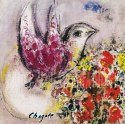
06.08.16 (Sivan 2, 5776) People live in despair because they are often double-minded. Consciously or not, they are attempting to look at two different things at once. They seek their end in a world of finite things – in "good fortune," in personal honor, in worldly entertainment, or other immediacies of the passing day. Such a cross-eyed approach leads to disorientation and spiritual destruction. A divided house cannot stand. But to be single-minded means first of all making the sincere decision to believe, and then confessing your faithlessness to God. As Soren Kierkegaard wisely observed: "No person is saved except by grace; but there is one sin that makes grace impossible, and that is dishonesty; and there is one thing God must forever and unconditionally require, and that is honesty." Therefore we are instructed to confess our faults one to another, and pray for one another, that we may be healed (James 5:16). As it is written: "You must be wholehearted (i.e., simple; sincere) with the LORD your God" (Deut. 18:13).
תָּמִים תִּהְיֶה עִם יְהוָה אֱלהֶיךָ
ta·mim · ti·he·yeh · im · Adonai · E·lo·he·kha

"You shall be wholehearted with the LORD your God"
(Deut. 18:13)

In the Sefer Torah (i.e., the handwritten Torah scroll), the first letter of the word tamim ("simple, wholehearted") is written extra LARGE in order to emphasize its importance. Notice also the little word im (עִם), "with," that follows in this verse. This hearkens to the simplicity spoken of by the prophet: "What does the LORD require of you but to do justice, and to love kindness (chesed), and to walk humbly with your God?" (Micah 6:8). Having a humble heart walks "with" the LORD. Genuine humility begins with the awareness that 1) there is a God and 2) you are not Him.... It is the practice of "knowing before whom you stand" and living your life in light of this fundamental truth.
When we study Scripture or things of "religion," we must be careful not to lose sight of what is important. We should serve God with "simplicity" (תֻּמָּה), that is, sincerely, with all our hearts and with straightforward intent. We should use a "single eye" and resist the temptation to "read into things" (Matt. 6:22-23). Indeed, God knows that we can evade the truth by means of being overly "sophisticated" when we read the Scriptures. The essential truth is plain enough, but we want to split hairs, consult a variety of commentaries, engage in mystical speculations, and so on, all in an attempt to defend ourselves against hearing from the Spirit of God! But as it says in Scriptures: holekh batom yelekh betach, "Whoever walks in simplicity (בַּתּם) walks securely" (Prov. 10:9).
Kierkegaard once lamented: "The matter is quite simple. The Bible is very easy to understand. But we Christians are a bunch of scheming swindlers. We pretend to be unable to understand it because we know very well that the minute we understand we are obliged to act accordingly." Indeed - there is a real danger of merely "thinking about" truth rather than living it... For instance, you might study the Psalms as literature and attempt to understand the nuances of Hebrew poetry, but that is altogether different than reading them with inner passion, with simple faith and the earnest desire to unite your heart's cry with the devotion that originally gave life to the sacred words... Likewise you might study Torah, pronounce the Name YHVH, carefully observe the festivals, and hope to "correct" Christians regarding their religion, and still be a lost soul... We must read with a heart of faith to unlock the truth that speaks to the heart. If you believe only what you understand, your faith is actually grounded in your own reasoning, not in the Divine Voice of Love.
 |
Sound of Silence...

[ The following is related to our Torah reading for this week, parashat Bamidbar... ]
06.08.16 (Sivan 2, 5776) The Hebrew word midbar ("desert") shares the same root as davar (דּבר) which means "word." We often need to be alone to hear God speaking kol demamah dakkah (קוֹל דְּמָמָה דַקָּה) - "the sound of a low whisper" (1 Kings. 19:12), and the journey into the desert was God's way of separating His people to speak with them "privately," so to speak (Jer. 2:2). But to hear the word we must humble ourselves, and the desert (i.e., "word") of Sinai is therefore first of all the word of humility (עֲנָוָה). When God spoke Torah to Israel, it was from a nondescript mountain - a place of emptiness, brokenness and need. Indeed, another word for Sinai is "chorev" (חרֵב), a word that means dryness and desolation. That is the starting point -- not the lush places of a future paradise. We receive Torah "bamidbar" because we can only hear God's davar in a place of lowliness and inner quiet. God brings us to an arid place -- inhospitable, and dangerous -- to reveal our need for Him, to show Himself as our Sustainer. The way to Sinai is a necessary excursion to prepare us to look for the greater hope of Zion. May God help us heed the whisper of His Spirit...
 |
Keep hope alive...

06.07.16 (Sivan 1, 5776) The Spirit of God breathes out: "The grass withers, the flower fades, but the word of our God will stand forever" (Isa. 40:8). This verse sets up a great contrast between olam ha'zeh (עוֹלָם הַזֶּה) and olam ha'ba (עוֹלָם הַבָּה) – between this present world and the heavenly realm. King David states, "Behold, you have made my days a few handbreadths, and my lifetime is as nothing before you (וְחֶלְדִּי כְאַיִן נֶגְדֶּךָ). Surely all mankind stands as a mere vanity" (Psalm 39:5). Our hearts are restless until they find their rest in God, the Eternal, the abiding, and true: מִי־לִי בַשָּׁמָיִם - "Whom have I in heaven but you? And there is nothing on earth that I desire besides you" (Psalm 73:25). To the extent that we regard this world as our "home" we will find the transience of life to be tragic; but when we regard ourselves as strangers here, on our way to the Heavenly City, our transience becomes a passageway to the heavenly places (2 Cor. 4:16).
יָבֵשׁ חָצִיר נָבֵל צִיץ
וּדְבַר־אֱלהֵינוּ יָקוּם לְעוֹלָם
ya·vesh · cha·tzir · na·vel · tzitz
u·de·var · E·lo·hei·nu · ya·kum · le·o·lam

"The grass withers, the flower fades,
but the word of our God will stand forever."
(Isa. 40:8)

Hebrew Study Card
The carnal mind instinctively is afraid of change, since it implies death and dissolution, and therefore it reasons from a continuous state of dread (whether conscious or not). Hence the "besetting sin" of the flesh is to "absolutize" the moment and to otherwise regard the finite as an end in itself. But God is our "Rock," a metaphor that implies that He is the immovable foundation and cornerstone of all reality. The LORD is our strong refuge in the stormy changes we all face in this world; the Divine Presence both grounds us and sustains our way. Therefore the LORD is called El Ne'eman (אֵל נֶאֱמָן), "the faithful God." His very Name means certainty, reliability, strength, truth, reality, presence, being, life, and so on...
Whenever I read the news I am reminded that we are living in a "withered and fading world" -- nearing the prophesied "End of Days" (אַחֲרִית הַיָּמִים). But Baruch Hashem, our place (מָקוֹם) is grounded in truth that stands (i.e., יָקוּם, lit. "is raised up") forever! Yeshua is our life; he is the Word of our God that is raised up forever! So press on faith. Believing is seeing, not the other way around. "Keep yourselves in the love of God, waiting for the mercy of our Lord Yeshua the Messiah that leads to eternal life" (Jude 1:21).
Note: For more on this topic, see "Our Everlasting Consolation."
 |
I Need Thee Every Hour...

[ The following is related to the holiday of Shavuot, which begins in less than a week... ]
06.07.16 (Sivan 1, 5776) Today is Rosh Chodesh Sivan, which means that the countdown from Passover to the climactic 50th day of Shavuot is nearly complete. The great Torah sage Moses Maimonides once wrote: "The counting from Passover to Shavuot is carried out as one who waits for the coming of the human being he loves best, counting the days and hours." If the Passover redemption is incomplete without the giving of the Torah at Sinai, how much more is redemption given by the Messiah, the true Lamb of God, incomplete without the advent of the Spirit? The cross leads to the revelation of "deeper Torah," imbued by the inward power of the Holy Spirit that quickens our hearts to long for the coming of our Beloved Savior and the establishment of his kingdom over all the earth...
Just as the giving of the Torah happened at one specified time, but the receiving of it happens all the time, "in every generation," the same may be said regarding the ruach, the Spirit: every day we must open our hearts to the Divine Presence... "I need Thee every hour." The study of Torah never ends, since we are never without need for the Teacher.
 |
Revelation and Study...
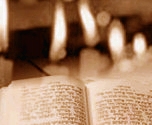
06.07.16 (Sivan 1, 5776) Some of the sages have made a connection between the Ten Days of Repentance (the time between Rosh Hashanah and Yom Kippur) and the seven weeks of the Omer Count (the time between Passover and Shavuot). Studying God's revelation is a prelude to re-experiencing the joy of His Presence, though this of course requires diligence and hard work. In order to understand what God requires of us, then, we must make an honest effort to study the truth of Torah and to practice it in our lives...
In Hebrew the word chinukh (חִנּוּךְ) means "education," a word that shares the same root as the word "chanukah" (חֲנֻכָּה, dedication). Unlike the ancient Greek view that pragmatically saw education as a humanistic means of escaping from "the cave of ignorance" to better one's personal power or happiness (Plato), the Jewish idea of education implies dedication to God and His concrete purposes on the earth. For example, the Rambam notes that the word chinukh is borrowed from the Torah's description of dedicating a tool for use with the Holy Altar, "habituating the tool for its work." In other words, godly education is a process of being made a "fit vessel" for the service of God in the world. All other ends of knowledge ultimately exist for this purpose, and rightly understood, education is a form of worship.
בְּאֵין חָזוֹן יִפָּרַע עָם
וְשׁמֵר תּוֹרָה אַשְׁרֵהוּ
b'ein · cha·zon · yip·pa·ra' · am
ve·sho·mer · to·rah · ash·rei·hu

"Where there is no vision, the people cast off restraint,
but the one who keeps Torah is made happy" (Prov. 29:18).

Download Study Card
May God make Torah sweet on our tongues and to help us be "engrossed" in the words of the Scriptures. There is no real blessedness apart from the truth of the Holy One...
Beatitudes of Humility...

06.06.16 (Iyyar 29, 5776) "Blessed are those who weep while the world goes on laughing, for theirs is the kingdom of heaven; blessed are the meek, for they shall overcome; blessed are those who realize they know little, for they shall find treasure; blessed are those who realize they are unrighteous, for they shall find healing; blessed are the misfits who are disowned by the world as fools, for they shall find mansions in heaven; blessed are the weak, for they shall be made strong; blessed are those who weep, for they shall obtain eternal consolation; blessed are those who refuse to assimilate into this world and its idols, for they shall be called victors in the world to come..."
God turns everything "upside down," for what is esteemed in this world is regarded as vanity in the world to come, and vice-versa. Indeed, the wisdom of this world is based on what I have called the "devil's logic," that is, the cynical notion that "truth" is nothing more than a political tool used to exploit others. The devil's logic is devoid of transcendental reality and therefore relies on compromise and "tolerance" to define truth as a form of "consensus" and "group think." Invariably this approach leads to ambiguity, confusion, cowardice, violence, absurdism, madness, and cruelty... It's fate belongs to eternal wasteplaces that attract and draw energy from the so-called power of the lie...
The Scriptures teach, "Light is sown for the righteous (tzaddikim), and joy for the upright (yashar) in heart" (Psalm 97:11). May it please the LORD God to renew our courage to live wholeheartedly according to His truth, and to resist the pressure to conform to the idolatry of this world. Amen.
 |
A Spirit of 'Yes'...

[ The following is related to our Torah reading for this week, parashat Bamidbar... ]
06.06.16 (Iyyar 29, 5776) Our Torah portion this week begins: "The LORD spoke to Moses in the desert of Sinai, in the tent of meeting (ohel mo'ed), on the first day of the second month, in the second year after they had come out of the land of Egypt" (Num. 1:1). Note again that the LORD spoke in the desert (ba-midbar) of Sinai, and that the Hebrew word for "desert" (i.e., midbar: מִדְבָּר) shares the same root as the "word" (i.e., davar: דָּבָר), which suggests that we hear the Word of God in a place of emptiness, brokenness and ongoing need. But note further that the LORD spoke in the "tent of meeting" (אהֶל מוֹעֵד), which may be read as the tent of "mo'ed" (מוֹעֵד), or "holiday." We celebrate our need for God's healing and turn to him in a state of gratitude, even despite our sinful condition (Psalm 119:71). We take courage and draw near, renewed in trust. That is why the verse says it was "the first day of the second month" (חדֶשׁ הַשֵּׁנִי בַּשָּׁנָה) -- the word "month" (chodesh) can be read as "new" (chadash), suggesting it was a time of renewal, a time to celebrate a new beginning (Acts 2:1-4). When David prayed in his need: "Create in me a clean heart, O God, and renew a right spirit within me" (Psalm 51:10), the Hebrew may be read: "Create in me a pure heart, O God, and renew within me ruach nachon (רוּחַ נָכוֹן) - a spirit of "Yes!" As Paul said of Messiah our Healer: "For all the promises of God find their Yes in him" (2 Cor. 1:20).
Preparing for Revelation...

[ The following is related to the holiday of Shavuot, which begins June 11th at sundown... ]
06.05.16 (Iyyar 28, 5776) A week is called shavu'a (שָׁבוּעַ) in Hebrew, from a root word sheva (שֶׁבַע) that means seven. Seven is the number of holiness and completion, and the first verse of Torah has seven words (בְּרֵאשִׁית בָּרָא אֱלהִים אֵת הַשָּׁמַיִם וְאֵת הָאָרֶץ). Moreover, in six days God created the heavens and the earth, but on the seventh day he rested and set it apart as sacred (Gen. 2:3). The holiday of Shavuot (שָׁבוּעוֹת), or "weeks," marks the "Jubilee of Passover," which occurs after we count 7x7 (49) days from the day following Passover until we reach Sivan 6 (which this year begins May 23rd at sundown). Since Shavuot occurs on the 50th day after Passover, the Greek translators of the Torah called it "Pentecost" (πεντηκοστή). Shavuot marks the goal or climax of Passover season, commemorating both the anniversary of the giving of the Torah at Sinai as well as the giving of the Holy Spirit to the followers of Messiah (Acts 1:8; 2:1-4).

In traditional Judaism, Shavuot ("Weeks," "Pentecost") marks the culmination of the experience of redemption, sometimes called Atzeret Pesach (עֲצֶרֶת פֶּסַח), or "the Gathering of Passover." Since the Exodus from Egypt led to the revelation given at Sinai 49 days later, the goal of redemption was the giving of the Torah to the Jewish people. In other words, the LORD took the Jews out of Egypt so that they would be His own treasured people, holy and separated from the pagan cultures around them, living in the light of his great revelation. Indeed, all of the mo'edim (holidays) of the biblical calendar are connected with this event, including the fall festivals of Rosh Hashanah, Yom Kippur and Sukkot.
It is an old custom to attend services during erev Shavuot and to stay the entire night listening to poems and reading selections from the Torah and from the Talmud (this custom is called tikkun leil shavu'ot: תִּקּוּן לֵיל שָׁבוּעוֹת, "rectification for Shavuot night"). This custom is observed to "repair" the night of Shavuot from the error of sleeping so soundly before the Torah was revealed at Sinai that God had to awaken the Jews with piercing shofar blasts, thunder, and lightning the following morning. After this all-night vigil, morning prayers are recited thanking God for the revelation at Sinai.

Jewish tradition teaches be'chol dor vador - that in every generation each person should consider him or herself as having personally received the Torah at Sinai. The climax of the Shavuot morning service is the recitation of the famous Akdamut poem followed by the reading of the Ten Commandments, when all the congregation stands to "relive" the experience at Sinai. A second Torah scroll is then taken out of the ark and the portion is read (Num. 28:26-31) that describes the sacrificial offerings made at the Temple during Shavuot, and the Haftarah (Ezek. 1:1-28; 3:12) concerns the amazing revelation of God in the form of the Throne/Chariot.
The holiday of Shavuot is one of the shelosh regalim (three major "pilgrimage festivals") commanded in the Torah (Exod. 23:14-17; Deut. 16:16) and therefore it reveals profound spiritual truth for followers of Yeshua (Luke 24:44; 2 Tim. 3:16). God did not want us to miss the significance of this holiday, since it expresses the freedom and truth of the New Covenant of Zion. From my family to you: Shavuot Sameach - "Happy Shavuot!" May this be a time of renewal and great joy in your lives....
Note: I am aware that some people insist that Shavuot must occur on a Sunday, following the Sadducee's interpretation that "the day after the Sabbath" (Lev. 23:15) refers to the first day of the week, rather than to the day following the Sabbath of Passover. This has been the historical position of most "mainline" Christian churches... Everyone can (and should) follow their own earnest conviction on this subject (Rom. 14:5). I follow the traditional Jewish interpretation to identify with the worldwide Jewish community, whereas others might begin the omer count starting on the first Sunday after Passover. I would urge everyone to exercise humility here, because there are genuine differences of opinion among people of good will on this subject. As it is written: "Knowledge puffs up, but love builds up. If anyone imagines that he knows something, he does not yet know as he ought to know; but if anyone loves God, he is known by God" (1 Cor. 8:1-3).
 |
Accounted by God...

[ The following is related to our Torah reading for this week, parashat Bamidbar... ]
06.05.16 (Iyyar 28, 5776) Parashat Bamidbar is always read immediately before the great holiday of Shavuot (i.e., Pentecost), which is the time we celebrate "mattan Torah" -- the giving of the Torah of the LORD (first at Mount Sinai, later at Mount Zion). Central to Bamidbar is the counting of the person, identifying his "place" within Israel (Num. 1:52), and therefore the sages link the idea of being counted with the revelation of God itself. In other words, as we come to know who we are as God's redeemed people, as we learn to reckon ourselves as his beloved, so we will receive Torah and be accounted among his people. Our heads will be "lifted up," and we will receive the first blessing of Torah, namely: anokhi Adonai Elohekha (אָנכִי יְהוָה אֱלהֶיךָ), "I AM the LORD your (singular) God" (Exod. 20:2).
"The LORD spoke to Moses in the desert of Sinai... saying 'Lift up the head' (i.e., count) of the children of Israel (Num. 1:1). The Torah commentator Rashi insightfully noted that as we are counted, so we are lifted up and beheld by God. In other words your life matters to heaven, and you are counted worthy because of God's great redeeming love. The sages say that each of us is as a letter of Torah; each of us counts in God's book. Indeed our beloved Savior Yeshua said, "Even the hairs on your head are numbered" (Matt. 10:30).
Holiday Note: Friday, June 10th (at sundown) marks the end of the 49 days of counting the omer, and therefore the following day is the "Jubilee" of Shavuot (i.e., "Weeks" or "Pentecost"). Recall that the Torah instructed (Lev. 23:15-16) that we count from the day following Passover (i.e., Nisan 16) for exactly seven weeks, until Sivan 5 (i.e., from April 23rd until June 10th this year). On the 50th day (i.e., Sivan 6), a special celebration was to be observed marked by jubilation and thanksgiving. This annual "countdown period" recalls both the time from the Passover until the revelation at Sinai, and the advent of the Holy Spirit among Yeshua's disciples in Jerusalem (Acts 2:1-4).
Be Filled with the Spirit...
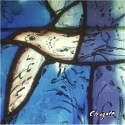
06.03.16 (Iyyar 26, 5776) Our Heavenly Father sees in secret... "The deepest thing in our nature is this region of heart in which we dwell alone with our willingnesses and our unwillingnesses, our faiths and our fears" (William James). It is there, in the secret place of the heart, that the sound of the "knock" is either heard or disregarded (Rev 3:20). May the Lord give us the willingness to do His will and the courage to believe in His love. And may God deliver us from doubt and from every other fear. May we all be strong in faith, not staggering over the promises, but giving glory to God for the miracle of Yeshua our LORD. May we all be rooted and grounded in love so that we are empowered to apprehend the very "breadth and length and height and depth" of the love of God given to us in Messiah, so that we shall all be filled with all the fullness of God. Shabbat Shalom, chaverim!
Whatever happened to sin?

06.03.16 (Iyyar 26, 5776) Today the word "sin" is rarely used to denote the intentions, decisions and selfish actions that violate the will of God, but instead the word has been redefined in psychological (or social) terms, as a form of "disorder" that imprisons people to self-defeating or "unhealthy" habits. Humanistically speaking, "forgiveness of sin" means "adjusting the person" to be free from any anxiety of divine judgment, with the therapeutic goal of enabling the soul to pursue personal happiness and pleasures without regard to the moral law of God... The most common Hebrew word for sin (i.e., chet: חֵטְא) is often translated as "missing the mark" (i.e., of the divine ideal) though that definition does not capture the intent of the person, that is, the decision (often subconsciously expressed) to aim at a mark contrary to what is good. Sinning, in other words, should not be regarded as passively "missing" the will of God, as if it were an "accident" of some sort, but rather as actively defying God's will by choosing a different goal altogether. In this sense sin may be understood as treason against the truth, open rebellion against divine authority, the willful defiance of moral order, and the deification of the self as the object of ultimate concern...
Notice that, spiritually understood, sin is not an occasional "misstep" of the will, but an eternal falling away from the Eternal -- an ontological break from Reality and Truth. We are not sinners because we sin, we sin because we are sinners, and that means that we need deliverance – objective salvation and healing – from the root problem of "spiritual death." The first condition for receiving deliverance, then, is rigorous honesty, especially with ourselves: "The purest of heart is precisely the one most willing to comprehend his own guilt most deeply. Without purity of heart, no one can see God, and without becoming a sinner, no human being can come to know God" (Kierkegaard). We must be careful here. This is not a matter of "morality" or "ethics" – a mere failure to understand what is right, but instead constitutes an unwillingness to understand, a refusal to will the rightness of truth... That is why the original sin was rooted in an act of will, not in an act of knowing, since the essence of the temptation was expressed in the decision to define good and evil in merely human terms.
We only find salvation through the consciousness of sin, and any attempt to enter by another way is treason against the message of the cross of Messiah. This is the "terrible struggle" with the Eternal – with God and oneself – as we let go and die to the conversation of the self-life; as we surrender and engage God's truth – which again is not found by mere intellectual assent, but by an act of will, by teshuvah, by faith, and by learning to endure yourself along the way. The LORD "dwells" with one who is of a contrite and lowly spirit (Isa. 57:15), he "tabernacles" within the heart of the poor in spirit, with those who mourn over sin and who hunger and thirst for His righteousness...
 |
Power to the Faint...

06.03.16 (Iyyar 26, 5776) "Have you not known? Have you not heard? The Eternal One, the LORD, is the Creator of the ends of the earth (בּוֹרֵא קְצוֹת הָאָרֶץ). He does not faint nor grow weary; his understanding is unsearchable. He gives power to the faint, and to him who has no might he increases strength" (Isa. 40:28-29). Human reason has no objection that God can impart strength, but it objects that strength is found in those who are broken and weary, that is, to the "poor in spirit" who mourn over their lives... And yet it is so: God gives strength to the weary, to the faint, to those who are at the end of themselves: "My power is made perfect (τελειοῦται) in weakness" (2 Cor. 12:9). Man's way is to seek charisma, to esteem those who have natural beauty, charm, or special talents, whereas God's way is first to break us, to make us weaker and weaker, so that he can then fill us with the miraculous divine nature (2 Cor. 4:7). Like all sacrifices that were brought to the altar, we must pass through death to life by means of our union with the Messiah at the cross... It is only after the cross that it may be said, "It is no longer 'I' who lives; now it is Messiah who lives His life in me." There is indeed strength, power, and victory – but such comes after we reckon carnal energy as useless. Indeed, the word "Hebrew" (עִבְרִי) means one who has "crossed over" (עָבַר) to the other side, as our father Abraham did (Gen. 14:13). It is on the other side of the cross that we experience the very power that created the universe "out of nothing" (i.e., yesh me'ayin: יֵשׁ מֵאַיִן) and that raised Yeshua the Messiah from the dead. "Not by might, nor by power, but by My Spirit, says Adonai Tzeva'ot."
נתֵן לַיָּעֵף כּחַ
וּלְאֵין אוֹנִים עָצְמָה יַרְבֶּה
no·tein · la·ya·ef · ko·ach
u·le·ein · o·nim · otz·mah · yar·beh

"He gives power to the faint,
and to him who has no might he increases strength"
(Isa. 40:29)
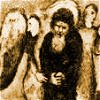
Download Study Card
Note that the word translated "strength" in this verse (otzmah) comes from the same root for "bones" (עֲצָמוֹת). This alludes to the vision of the "dry bones" being clothed with life at the time of resurrection. "Thus says the Lord God to these bones: 'Behold, I will cause breath to enter you, and you shall live'" (Ezek. 37:5). If God has the power to give life to dessicated bones, surely his resurrection power can "quicken us" through the life of our beloved Savior Yeshua who said, "You will receive power (i.e., koach: כּחַ) when the Holy Spirit has come upon you, and you will be my witnesses" (Acts 1:7). Indeed you can do "all things" through Messiah who strengthens you (Phil. 4:13).
The Fear of the LORD...

06.02.16 (Iyyar 25, 5776) Our Torah portion this week (Bechukotai) includes a litany of woes assured to befall those who spurn God's Torah or break covenant with Him (Lev. 26:14-46). The deeper intent of this admonition (tochechah) is to warn us of the grave danger of forfeiting our relationship with God – that is, of refusing to be healed of our illusions... Chastisement is a blessing from heaven, the "troubles of love" (יִסּוּרֵי אַהֲבָה), since its goal is to bring us back to God and to deliver us from eternal loss. This is why Yeshua spoke about the dangers of hell: if we do not heed the Voice of divine love, we risk literally everything, and that loss is irremediably eternal... God's warning about hell expresses the great passion of his heart for us; his love calls us to receive eternal life and blessing, but if we refuse to come, we will suffer the loss of the only thing that ultimately matters. As it is written: "It is a fearful thing to fall into the hands of the Living God" (אֱלהִים חַיִּים).
The fear of losing love evokes a healthy zeal to protect it from loss... The same may be said of God's relationship with us. The gospel represents God's passion for us, the call of his heart, his desire to elevate us to the role of the beloved, and we respond by accepting Him as the Lover of our souls, the Ultimate Concern of our life. Sin threatens to seduce us away from God's love, to interfere with our relationship, which evokes God's "jealousy" to protect love from loss. This is what the "fear of the LORD" (יִרְאַת יְהוָה) most radically means: God's own fear that we would lose sight of our great need for his healing love...
It is written that "perfect love casts out fear" (1 John 4:18), but perfect love (τελεία ἀγάπη) must be "perfect," that is, reciprocal, complete, consummated, and alive with passion. In Hebrew, perfect love is "shalem" - that is, whole, healed, and unified (אַהֲבָה שְׁלֵמָה). Perfect love is both given and received... It is not "perfect love" to intellectually accept that God loves you in Yeshua our Savior. No, you must receive this as an inward passion, you must live within it, must embrace it, take possession of it, and let it fill your heart to abundance. This love, this "perfect love," then will cast away your fear of being unwanted, rejected, and abandoned. But to know this love, you have to open your heart and accept it as your own, the essential reality of who you are:
אֲנִי לְדוֹדִי וְעָלַי תְּשׁוּקָתוֹ
a·ni · le·do·di · ve·a·lai · te·shu·ka·to

"I am my beloved's, and his desire is for me"
(Song 7:10)

We are told to "work out our salvation with fear and trembling" (μετὰ φόβου καὶ τρόμου) since the love of God appeals to all of our heart, soul, mind and strength. Therefore may you fully accept that you are accepted; may you receive the blessing of God's passion for your soul; may you walk (i.e., live, move, and have your being) in the abundance of God's unfailing and everlasting love. Amen.
The Troubles of Love...

06.02.16 (Iyyar 25, 5776) Parashat Bechukotai is the concluding portion of the Book of Leviticus (וַיִּקְרָא), which is the central book of the Torah. In light of all that God had done for the Jewish people - from their great deliverance in Egypt to the ordination of the priesthood in the Tabernacle - God expected them to live up to their high calling as His chosen people: "You shall be holy, for I the LORD your God am holy" (Lev. 19:2). Therefore, some of the sages say that the central point of this concluding portion is tochachah (i.e., the warning of punishment) rather than nechamah (i.e., comfort). The focus is not, "If you walk in my laws" (Lev. 26:3), but rather, "if you do not listen (shema) to me" (Lev. 26:14)....
It has been said that the opposite of love is not hate, but rather indifference, and that explains why the punishments would come if the people "left their first love." Indeed, the "rebuke" portion of the tochachah begins with v'im lo tishme'u li (וְאִם־לא תִשְׁמְעוּ לִי), "if you do not listen to me" (Lev. 26:14), which recalls the Shema and the duty to love the Lord bekhol levavkha, "with all your heart." If the people walk carelessly (i.e., keri: קְרִי) with God, then God will afflict them with "the troubles of love" (i.e., yissurei ahavah: יִסּוּרֵי אַהֲבָה). A student once asked his rebbe: "Do we get punished for our sins in this world?" His succinct response was, "Only if we are made fortunate..." The worst possible fate is for God to be indifferent to someone! Can anything be more tragic than to be forgotten or to go unnoticed by God? It is far better that He afflict you with yissurim shel ahavah - the "troubles of love!"
Jewish tradition generally regards the entire chapter of Leviticus 26 as "the" tochachah (הַתּוֹכָחָה), or "rebuke," even though the chapter itself begins with promises of blessing for obedience to God's law (Lev. 26:3-13). The sages of the Talmud regard the "rebuke section" of this chapter (Lev. 26:14-46) as even more severe than the tochachah found in the Book of Deuteronomy (Deut. 28:15-68), because it was spoken directly by the LORD to the Jewish nation as a whole, whereas the latter warning was spoken by Moses himself and addressed in singular form (Megillah 31b). As I mentioned in another place, it is often difficult to find volunteers to publicly read this portion during synagogue services, and the custom arose to have just one person read the rebuke section as one long aliyah (as opposed to breaking it up for several people to read smaller parts). It is also customary for the one making this aliyah to recite the passage in a lowered tone of voice...
The tochachah of Bechukotai begins with 11 verses that promise blessings for obedience to God's laws, but three times as many (i.e., 33 verses) that promise punishment for disobedience. To help "offset" this discrepancy, the midrash notes that blessing section begins with the letter Aleph (in the word אִם) and ends with the letter Tav (in the word קוֹמְמִיּוּת), which suggests that the blessings encompass all other possible blessings (from Aleph to Tav). On the other hand, the punishment section begins with the letter the Vav (in the word וְאִם) and ends with the letter Hey (in the word משֶׁה), the last two letters found in the Sacred Name (יהוה), which suggests that God's compassion would be present even in the suffering to come in the latter days. Another way to look at this is to regard the letter Vav as the symbol of man, and the letter Hey as the symbol of the Spirit: in the end - after the punishments were complete - God's compassion would prevail over His judgment for sin, and the Spirit of God would rest upon Israel. The midrash further states during the days of the Messiah, Israel will keep the Torah, "from Aleph to Tav" (i.e., from beginning to end), and at that time all the blessings God promised to them would finally be fulfilled.
The idea of tochachah is not simply something for ethnic Israel, of course, since the New Testament likewise warns us that God will punish those who likewise walk carelessly (i.e., keri: קְרִי) with Him. Have you forgotten the exhortation that addresses you as God's children? "My son, do not regard lightly (ὀλιγώρει) the discipline of the Lord, nor be weary by his reproof (תּוֹכֵחָה). For the Lord disciplines the one he loves, and reproves (יוֹכִיחַ) every child whom he receives" (Heb. 12:5-6; Prov. 3:11-12). The Lord charged the assembly at Ephesus that they had let go of their first love. Yeshua therefore urged them: "Remember from what high state you have fallen and repent! Do the deeds (ἔργα) you did at the first; if not, I will come to you and remove your menorah from its place – unless you repent" (Rev. 2:4-5). Because God is never indifferent toward those who are trusting in His salvation, he will discipline and correct us to keep close to Him. He will afflict us with the "troubles of love." As it is written, "It is a fearful thing to fall into the hands of the Living God" (Heb. 10:30).
Regarding the litancy of woes, troubles, and curses listed in parashat Bechukotai, I'd like to relate a beautiful story I once read long ago.... The son of a Torah sage was away from home during the Shabbat of Bechukotai, so he went to a different synagogue to heard it read. As he listened to the cantor (reader), he became progressively alarmed at the severity of the curses, until he fainted in the middle of the reading. After he was revived he was asked if this happened to him every year, to which he replied, "No, when my father reads the Torah, the curses sound like blessings." Amen. Rightly heard. the warning of punishment for our sin should awaken us to hear the heart of our heavenly Father, who loves us and profoundly cares how we live our lives...
For more on this topic see: "The Troubles of Love: Further Thoughts on Bechukotai."
 |
Righteousness of God...

06.02.16 (Iyyar 25, 5776) It is not "I obey, therefore I am accepted," but rather, "I am accepted, and that is the obedience of faith." Accepting that you are accepted – despite your unacceptability – is the first (and last) step of faith, and there is no point beyond we must go. It is not your wisdom or cleverness that enlightens your way in the truth, however, but the miracle of disclosure from heaven. It is all a gift: you need God to even see that you need God. Right thinking is indeed a path to God, but it is the givenness of truth that enables the seeker to seek; it is the reality of the Teacher (the Savior) that is all-important. By themselves, true beliefs do not conjure divine favor, and indeed they may hide the deeper truth that the heart exists in untruth despite the head's "true" doctrine. Likewise, while goodness is indeed a path to God, true goodness is that found in God's righteousness that makes the way right for the trusting heart...
"Not by works of righteousness (מַעֲשֵׂי הַצְּדָקָה) which we have done, but according to his mercy he saved us, by the washing of regeneration, and renewing of the Holy Spirit, whom he poured out on us richly through Yeshua our Savior, so that being justified by His grace we might become heirs according to the hope of eternal life." – Titus 3:5-7
 |
Bound by Love's Promise...

[ The following concerns our Torah reading for this week, parashat Bechukotai... Please review the Torah portion to find your place here... ]
06.01.16 (Iyyar 24, 5776) From our Torah portion this week (i.e., Bechukotai) we read: "Then [after all the various judgments have befallen the people] I will remember my covenant with Jacob, and I will remember my covenant with Isaac and my covenant with Abraham, and I will remember the land" (Lev. 26:42). Here we note the "deeper Torah" of God's unconditional promise to the children of Israel that "contextualizes" the various tribulations they would suffer because of their disobedience to the terms of the covenant given at Sinai (Gen. 15). Therefore the Apostle Paul appealed to God's promises given to Abraham as the foundation for Torah, not to Israel's righteousness procured by means of the law (Rom. 9:31; Gal. 4:24-27). "For the promise to Abraham and his offspring that he would be heir of the world did not come through the law (οὐ γὰρ διὰ νόμου) but through the righteousness of faith" (Rom. 4:13). The better covenant of Zion was prefigured at Mount Moriah - and hearkens back to Abraham and Isaac - not the later covenant made at Sinai (Gen. 22:16-18; Heb. 6:13-15; John 3:16). As for Israel in the galut (exile), God has promised: "But I will for their sake remember the covenant with their forefathers, whom I brought out of the land of Egypt in the sight of the nations, that I might be their God: I am the LORD" (Lev. 26:45). Note again that this covenant relationship was established when we were without anything – we had no Torah, no mitzvot, nor any good deeds to commend ourselves before heaven. Nevertheless, God chose us and called us his people, and all this comes from his great love.
Bound by love's promise... Now that's Torah!!!
 |
Feeding on Faithfulness...
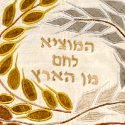
06.01.16 (Iyyar 24, 5776) In our Torah for this week (i.e., Bechukotai) we read: "You shall eat your bread to the full and be satisfied" (Lev. 26:5). The gift of contentment is a great blessing, since it means being free from the pain produced by unrelenting and imperious desire... Indeed, a perpetual, insatiable craving is a sign of slavery to inner emptiness, and no amount of food, drugs, romance, etc., can ever fill this spiritual void. This is why we need true bread, the bread that gives life (לֶחֶם הַחַיִּים), and this bread is the spiritual nourishment Yeshua gives to our hearts (John 6:35). When we taste his bread, when we commune with him, we soon learn that our desires for other things are hallow, futile, and empty. The more we feed on his love, the more we will find ourselves free the tyranny of lesser desires.
תּוֹדִיעֵנִי ארַח חַיִּים
שׂבַע שְׂמָחוֹת אֶת־פָּנֶיךָ
נְעִמוֹת בִּימִינְךָ נֶצַח
to·di·ei·ni · o·rach · cha·yim
so·va' · se·ma·chot · et · pa·ne·kha
ne·i·mot · bi·min·kha · ne·tzach

"You will cause me to know the path of life;
in your presence there is fullness of joy;
at your right hand are pleasures forevermore."
(Psalm 16:11)

Download Study Card
The blessing we traditionally regularly recite over bread (hamotzi lechem) is a prophecy of sorts: "Blessed are You, Lord our God, who will bring bread up from the earth." This applies first of all to the resurrection of Yeshua from the dead, but it also applies to Yeshua as lechem ha-chayim (לֶחֶם הַחַיִּים), the Bread of Life, who meets our heart's needs (John 6:35). As we feed on God's faithfulness, we shall be satisfied...
|









































































